#Everything Changed When The War Arc Attacked
Text
Everything Changed When The War Arc Attacked:
Or, why do I hate the War Arc so fucking much?
At this point, eh, why not? Writing every day is supposed to be good for improving as a writer.
ECWTWAA is a simple, quippy line that holds all of my festering loathing for watching MHA gleefully hurl itself off a cliff once the War Arc happened, and, much like someone jumping off a cliff like an utter moron (or the Air Nomads after the Fire Nation attacked), it has never truly recovered.
*sigh*
In retrospect, MHA had been going downhill for a long time before that point, and a lot of it was something I noticed unconsciously, but didn't quite rise to me really paying conscious attention to it, beyond a few notable points (*cough*, Bakugou, *cough* FuCkiNg NIGHTEYE), but as my brain was somewhat in the off position as I read, I was still enjoying the ride, even as it bumped; the enjoyment was as much, if not more, that I used to enjoy it more than the actual content, but there was enjoyment.
If MHA before The War Arc was a somewhat imperfect roller coaster ride, the only way I can describe the War Arc is if the roller coaster ride abruptly ended in the side of a cliff, only somehow dragged out for months of slow paced agony. I watched, in vaguely real time, as Hori systematically trashed the last foundations of his story, the swan song of one of the best, most interesting characters in the series, toss aside the sudden yet exciting development of it's main villain, and escalate to a higher gear than ever before the constant work to protect some of the most vile characters, including said mass murdering villain, from even the slightest criticism by sacrificing everyone around them, as well as the very integrity of the story, to the alter of, 'They're not that bad, honest! Don't hurt their little feelings, you bully!'
And, I watched him finally finish the lobotomy on his main character, permanently ripping away what remained of his original personality and intelligence, leaving an empty puppet, a Deku, with the singular purpose of driving the story faster, and faster, and faster towards that thing that Hori seems to crave above everything else now: The End.
Freedom, freedom from the strangling chains of a merciless Jump schedule, of a plot long grown too complex for him to manage, or for him to even want to try, and from the burden of writing characters and stories he so clearly seems to despise, for some reason. And if they only way he feels he can get it is by burning everything he's done down to the ground, well, Hori's clearly more than willing.
In all honesty it became obvious that, in all of MHA, he only actually liked six things: Endeavour, Bakugou, body horror, dramatic, flashy fight scenes with flashy super powers, attractive women in minimal clothing and vaguely fetish-y torture scenes on attractive women in minimal clothing.
These things, from that point on, are the only things he has spent real, actual time on, developing, giving focus to. Everything else, everything else, is rushed, pushed constantly forward by Deku, the puppet, as he runs from plot point to plot point as fast as he can, never allowed a moment to rest, to reflect, to really think at all, all in the name of progression as empty as he has become.
In all honesty, it was a needed, if unwanted, shock to help me realize the truth, but at what cost? At what cost is this clarity? The joy is gone now; once I dropped my unconscious acceptance of the narrative, everything I had been ignoring came to me a rush of horrified realization, even the most mild of flaws became glaring, and now reading the early chapters that got me into this story in the first place is just... hollow now, like I'm watching my old self enjoy them, rather than enjoying them myself, and I can't help but be both jealous and vaguely contemptuous at the innocent pleasure that person had.
I'll admit, I'm being more dramatic than I'd like to be, but... I've said this before, I'd been reading MHA for years before this point. Years of enjoyment, interest, and focus, and it's all ash to me now. I'm somewhat bitter about it.
#bnha critical#mha critical#everything changed when the war arc attacked#bakugou critical#endeavour critical#nighteye critical#izuku deserves better#izuku is a person#deku is a puppet#me looking at the dimension where hori didn't do any of this shit#reference post
73 notes
·
View notes
Note
Something I find interesting when viewing the two recent Dune movies as a whole is that initially, Paul is more than willing to use the prophecy and his visions for his own gain to convince Liet to help them, while Jessica whispers "careful!" at his side, and she later recommends they leave the planet entirely. But Paul decides they'll stay with the Fremen. Even at the beginning of Part 2, Paul is like "fuck yeah let's wage war on the Harkonnen" and Jessica is again counseling caution: "your father didn't believe in revenge." She goes through the Water of Life ceremony not because she wants to help Paul fulfill the prophecy but because she's forced to: do this or die. And even then, the old Reverend Mother had to use the Voice on her to get Jessica to drink.
That all changes when Jessica nearly dies during the ceremony. After that, Paul becomes more wary of embracing the prophecy, and she just throws herself into it. Paul nearly loses his mother (and his unborn sister) to a painful, agonizing poison - mere hours/days after losing his father and all their friends/allies to the Harkonnen slaughter - and decides it's not worth it. Meanwhile, Jessica gets a direct download of memories of millennia of oppression and goes "yeah let's burn everything to the ground."
It's an interesting, quick reversal at the beginning of the second movie, and it's great.
Ooh thank you for this great ask. I can always count on you for smart and thoughtful Jessica takes!
You make a really good observation about their reversal of positions--I had been struggling to figure out how Paul's line about "I must sway the non-believers" fit into his overall arc, but you are absolutely right that this feels like a continuation of how he talks to Liet. We're seeing the first stirrings of that little "maybe I am special" thought that later takes center stage.
For most of Part Two, Paul has several reliable counterweights pulling against that streak of arrogance and high-handedness that he's had from the beginning. Jessica almost dies drinking the Water of Life, which, like you point out, has got to make him think twice about encouraging people to believe in the prophecy. Then, he spends most of the movie surrounded by Chani and her friends and comrades, who seem the most skeptical of the prophecy and also aren't going to give his ego the time of day. And at the same time, he has an opportunity to pour his desire for revenge into collective political action that seems to be making a difference.
It's only when those countervailing forces start collapsing (the people who had started out as his equals are now becoming his followers; the Harkonnens attack Sietch Tabr and other civilian population centers, proving they are far from militarily defeated; Gurney shows up and immediately offers what seems like an easy solution to their problems that only Paul can access) that the little maybe I am special voice starts winning again.
As for Jessica, her journey doesn't get as much focus in the movie but it's also fascinating. She's a great character because she is so fucking smart at navigating power structures from what seems like an unenviable position. Did she have any choice about being sent to Caladan to become Leto's concubine? I am guessing she did not. But she sure figured out how to work that situation to her advantage. It happened that along the way she and Leto came to genuinely love and respect each other. But I'm sure she would still have figured out an angle even if that had not been the case.
In Part Two she starts out in a frankly quite terrifying position: she can undergo this unknown, dangerous ritual or die, and also possibly put Paul's safety at risk by raising doubt about whether he is the Lisan al-Gaib. But after she survives the Water of Life, she is launched into a powerful position in Fremen society and pretty quickly realizes she can use that to both protect Paul and get her revenge on the people who tried to kill her whole family. And unlike Paul, she is much more cognizant of the intergalactic power structures at work and aware that the Harkonnens themselves were a pawn in all this, so her target is the Bene Gesserit and the emperor.
I would have loved more time to explore Jessica's relationship to Fremen society and her POV in general. Because in some ways she becomes as Fremen as it's possible for her to be--she has access to thousands of years of memories of Fremen history and culture and politics; she becomes instantly fluent in the language and she is immersed in Fremen daily life in the sietch. (If there's one single thing I wanted more of, it was daily life in the sietch.) But she's still the same person she was, so she hasn't lost that ability to be ruthless and calculating and see people as forces to be manipulated. In Part One, her love for Paul and Leto provided an interesting counterweight to this that allowed us to see some moments of vulnerability from her (ie. she knows Paul has to undergo the Gom Jabbar test but she's terrified for him while it's happening). In Part Two she is so isolated for most of the movie (away from Paul; surrounded by followers who were never friends; I think we can all agree that talking to your unborn fetus doesn't really count) that we don't get a lot of these more unguarded moments from her. (I would have loved some Jessica/Stilgar action and it seems like the potential was very much set up for that, but I understand why they didn't have time.)
But in general I thought they did a great job of setting up this contradictory tension between Jessica and Paul, where they both want so desperately to protect each other and they both want revenge, but the way they each go about it ends up putting them in direct conflict with each other.
191 notes
·
View notes
Text
THERE WAS AN UPDATE YOU KNOW THE DRILL SLEEPING BE DAMMED
theres so much going on jokes that i will deffinetly take advantage of theories of the meaning of things the goddamn art everything
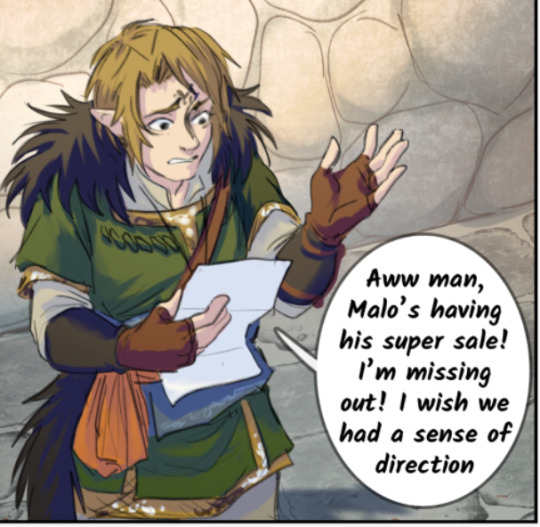
first of all apparently Malo Mart turned to a mega corporation???? well sorry twi no 60% of discount for you that sucks
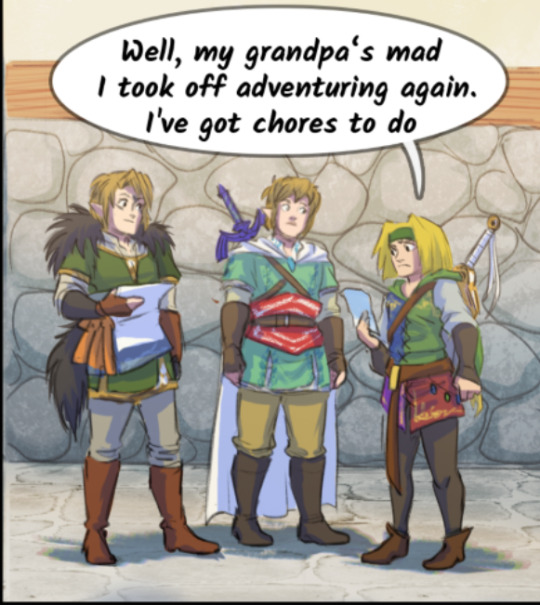
thats rough buddy
i cant take it seriously poor Four, look at that face
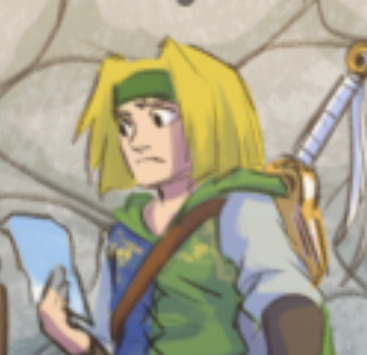
thats the face of someone who will be grounded for some time after all this madness and is totally not happy about this
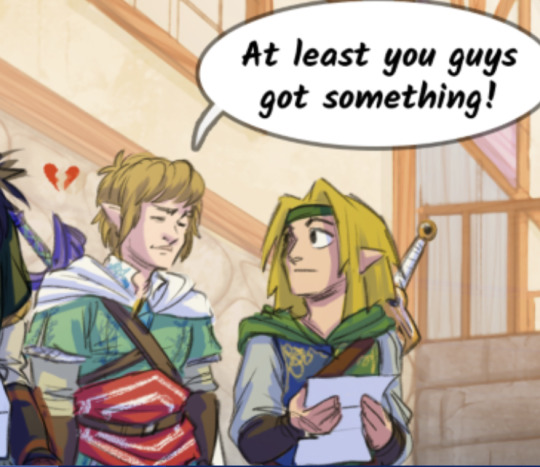
Sky was waiting letters from Sun, maybe she couldn't write something for him? either way poor guy look at his sad face :( the heart makes it better
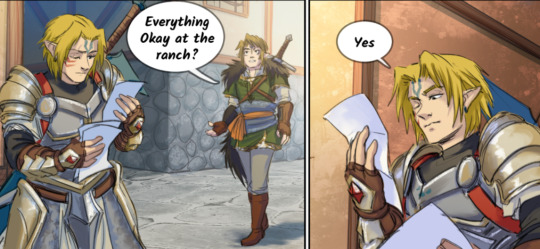
baby? baby??? smol???? smol hylian???? tiny cute litol hylian????child????
ahhh Time dont just say yes and left it like that! i need to know!!!
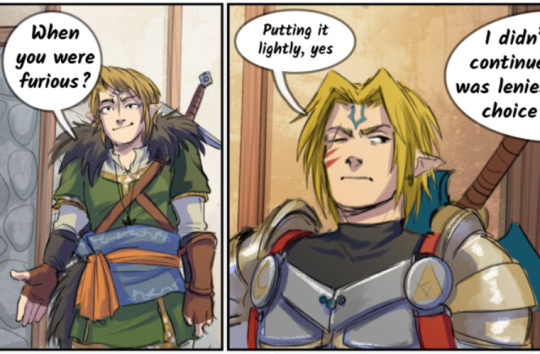
Twilight my man at this point you will be grounded dont test the old man's patience
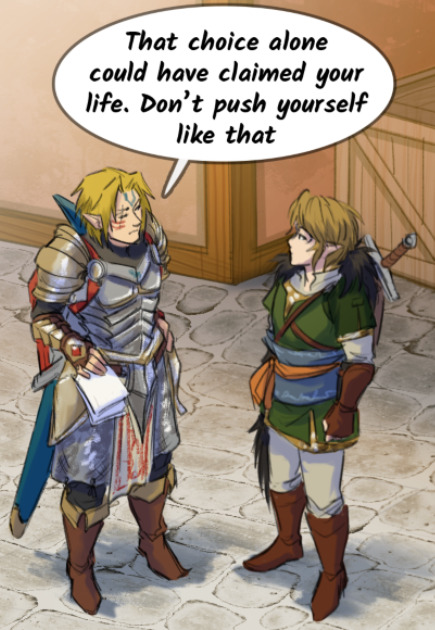
Time knows the dangers of excesive courage, yes it can keep you going and maybe make you win the battle, but can also kill you if youre not careful. This is what almost happened with Twilight, this almost might have happened to Time too
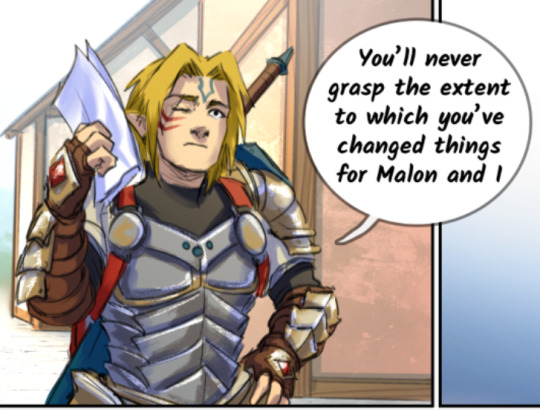
He's scared that for this reckless courage he might loose his descendant, the one who brought hope to him and his wife to form a family and live happy
(also he saying this makes me think more about the posibility of Malon being pregnant, too much mistery please old man just tell me i will not say anithing ur secret is safe plweas)
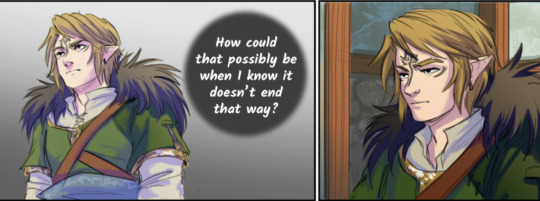
HERO'S SHADE HERO'S SHADE
not much to say here, it might be a wrong translation that im doing but hey! it reminds me that Twi already knows that Time is the Hero's shade but like. with flesh and eyes. alive.
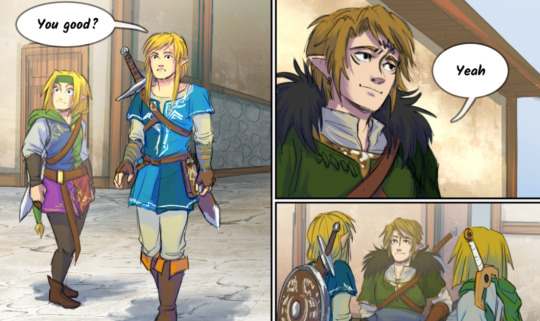
OKAY HERE I HAVE THINGS TO SAY
When Wild asks Twilight's face changes inmediately, he doesn't want to look down, he still feels the need to be strong in front of the younger heroes, worrying them is the last of his desires
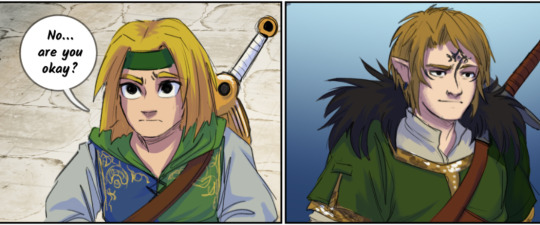
Four is not stupid, he notices the actual mood of Twi and ask again, but with different words. It looks like it really made Twi reconsider things
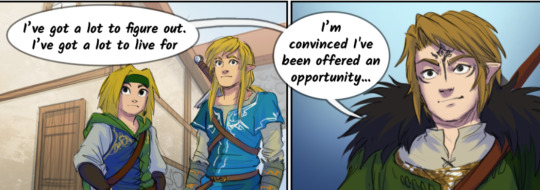
doesn't exactly talks what was having him a little down moments ago, but at least it seems to calm them, again, they shouldn't be worried after what happened
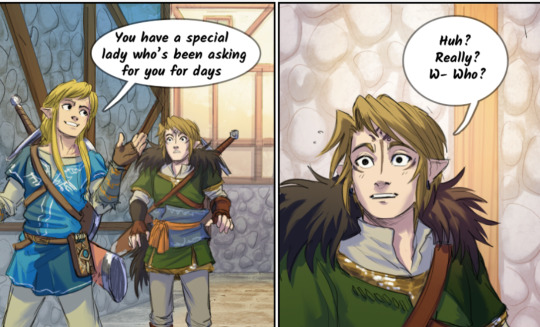
Twi for hylia who were you thinking he was talking about????
no really i have that question who was he thinking that was asking for him?????
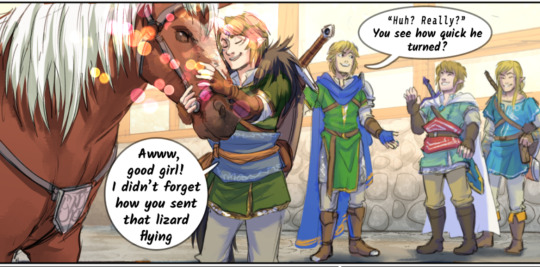
"who kicked the fuck out of that bad lizard??? who did that???? yes you did!! you did it amazing!!! im so proud my beautiful exterminator of dumb lizards!!!"
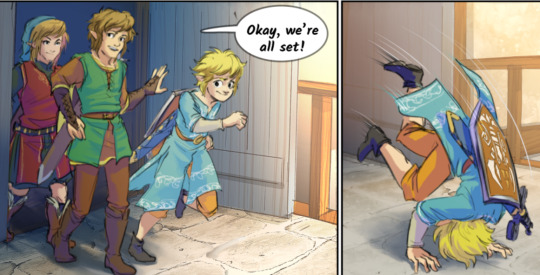
HE JUST
FUCKING ROLLS
YEAHHH WIND FLIP
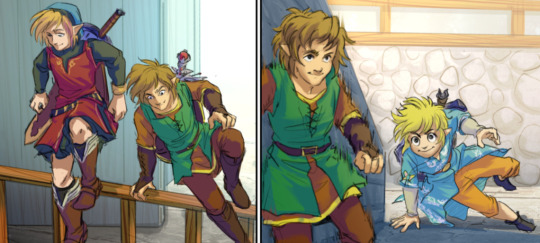
Hyrule 🥰🥰🥰🥰🥰💛💛💛💛💛✨✨✨✨✨✨✨
hes so badass jumping off heck yeah stairs are dumb
also Wind thats a cool move you too legend jumping and rolling are so cool love you guys
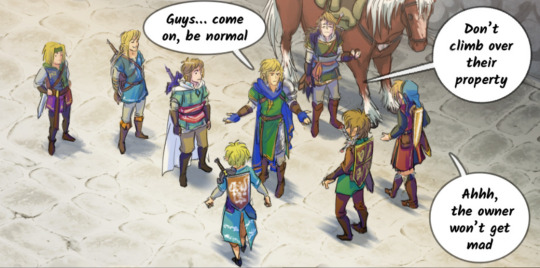
Wars dont ruin the fun nono guys keep doing it i'll even give you chips if you do that
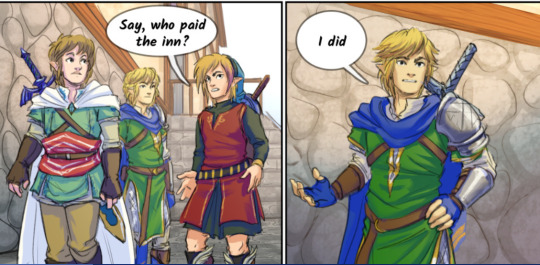
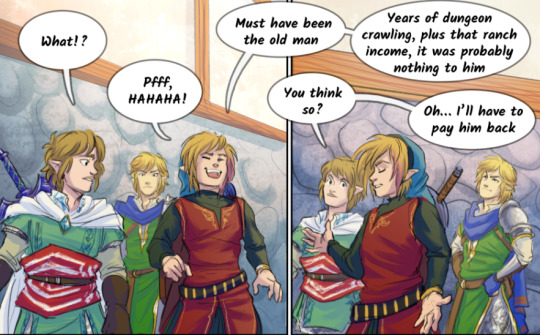
oh they really think that Wars is broke and has no money alright
im glad that this bit kept going i love the boys teasing each other (Lege and Wars specially)
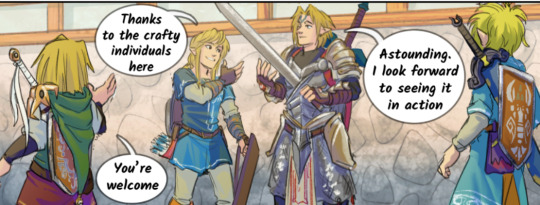
hey listen
listen
i dont want to ruin it
but
it would be funny
just
just listen
would be very funny that
it just
breaks
hey it would be funny cmon
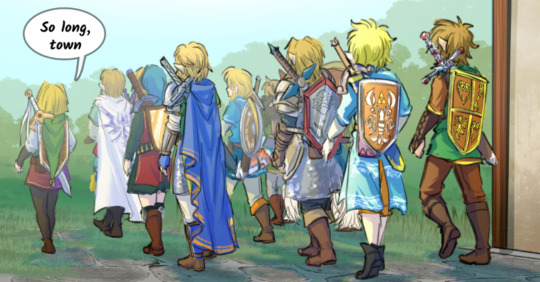
andddd theyre off!
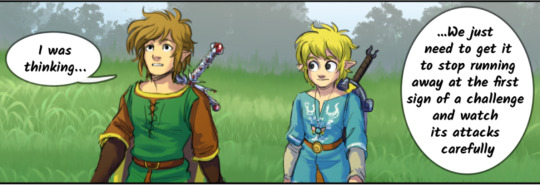
Hyrule learns from watching, from the actions and movements that he sees in the enemy, and uses it to make a plan to attack, learn patterns and be ready for anything
yep hes gonna play an important role in the next arc i have a feeling
now buildings art aprecciation cuz holy shit theyre so pretty
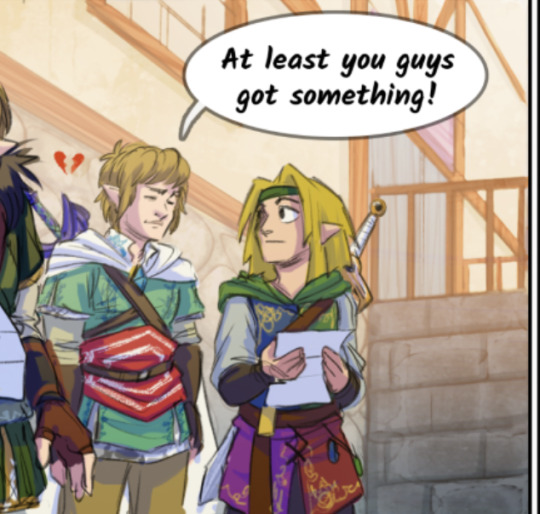
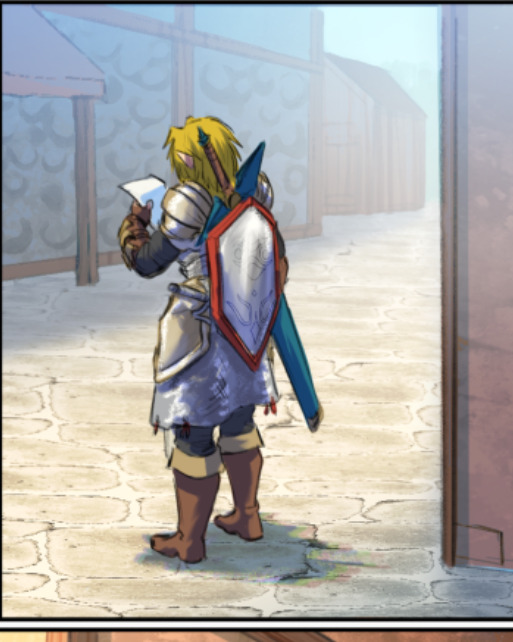
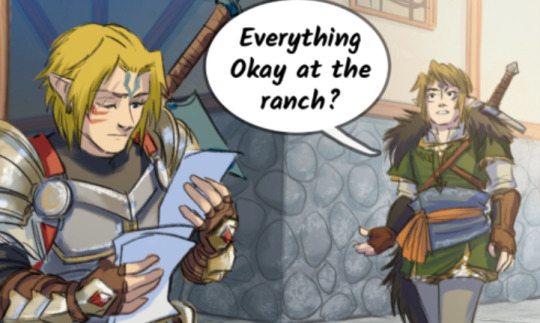
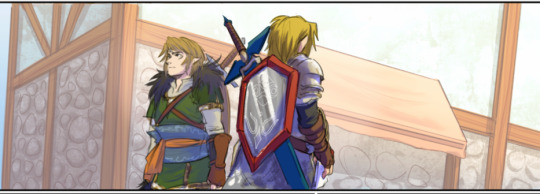

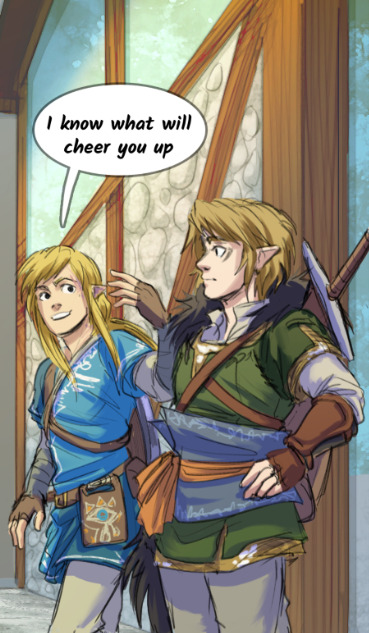
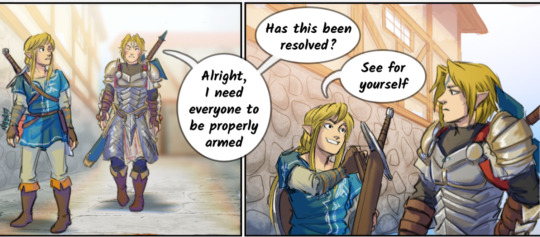

gorgeous
fantastic work i feel blessed
(all art credits obv goes to @linkeduniverse ! )
#linked universe#linkeduniverse#lu update#linked universe update#lu chain#lu spoilers#lu update spoilers#linked universe spoilers#i talk#uhhhh its almost 1 am#idc it was worthy
104 notes
·
View notes
Text
Barb and Crimp are not Redeemed characters and its odd how their films gave them happy endings.
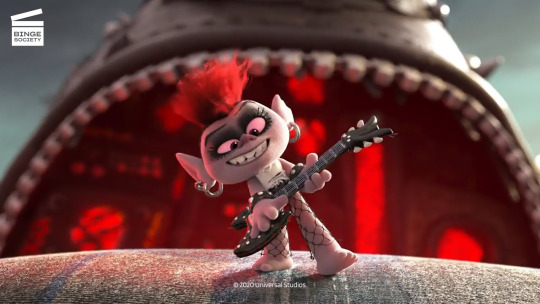
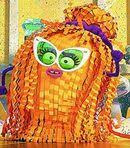
lets start with Barb for one she led armies attacking other Tribes destroying cities and imprisoning countless people all so she could get the strings.
and wipe out all other cultures deciding only her own should Remain and anyone who didn't conform to that culture would be turned into a brainwashed zombie.
some people try and argue she has good intentions but frankly her intentions aren't all that good compared to everything she did and this wasn't even a problem in the first place its not like all the Tribes were at war or anything.
they were fine living separately so combining the Tribes is a nice idea but going to these extremes is not excusable in any sense given there was no legit reason for her to take such extreme action.
and in the end she gets beaten she doesn't have a last minute change of heart and decide to do the Right thing
( tho to be clear this wouldn't mean it would suddenly be okay for her to face no consequences one posotive I'll say about Veneer's arc in TBT is that he was still held accountable in the end despite having a last minute change of heart because Redemption doesn't mean someone gets let off scott free if anything it means the opposite )
and after her defeat Barb is instantly forgiven for no legit reason like I know story wise you could argue its because she's queen and they don't want more conflict with the Rock Tribe.
but from a basic story point of view its wrong especially for a kids film Barb isn't only let off scott free but Poppy light heartedly befriends her.
and makes it clear there's no ill will so yeah showing a film where a villain who causes this level of destruction simply because they believe they are right is let off scott free is not very satisfying story telling imo.
and its bad in a kids film Teaching lack of consequences and accountability for your actions no matter how bad.
like don't get me wrong I like Barb personality wise and that's deffo why a good chunk of the fandom don't have a problem with her being let off the Hook.
but obviously villains being likable doesn't mean they shouldn't face consequences loads of people love Velvet but most of her fans can accept that she deserved to go to prison at the end for kidnapping and torturing someone.
and then there's Crimp she's less of a bad example but still an example she went along with kidnapping and torturing someone simply because she didn't want to lose her Job.
she came and went as she pleased only being held against her will right at the end and just because her bosses were mean to her doesn't mean she isn't still a villain.
the movie acts like this makes her a victim and someone who shouldn't be blamed for V and Vs crimes when frankly yes she should she was complicit.
she turned a blind eye to someone's suffering because she didn't wanna lose her pay check she's just a cowardly Henchmen not an out and out victim.
and she should have still been held accountable in the end for being an accomplice.
and I'm sorry but to circle back to my guy Creek the morality of the movies is all over the place in this regards.
the fact that the movies consider characters who actively chose to do evil things of their own free will as still redeemable and deserving of happy endings.
even with no actual work put in to better themselves yet Creek the literal Hostage tortured and threatened into doing a bad thing was lumped in with the actual big bad villain in the end.
and was seen as deserving of a gruesome comeuppance is frankly a Horrifying sense of morality and justice in my opinion.
yes he came back in the tv show but I'm only talking about the movie cannon.
and this way of thinking in Regards to what villains do and don't deserve to be Redeemed is Honesty arsed backwards.
characters who do evil things because they decided that they should get to make choices that effect and change other Tribes filled with large populations of people simply because they think their culture is better than other people's.
and characters who do evil things simply because they don't want to lose a Job no matter how much they may need it are infinitely worse.
than a character who simply gave in to the very human fear of not wanting to die horrifically and who was basically forced into the role of villain due to having literally no other option other than lie down and die.
I love Trolls but man these movies have a terrible sense of morality and they do not do Redemption Arcs well. 😅😅😅😅
#trolls#dreamworks trolls#trolls band together#trolls dreamworks#trolls 3#trolls world tour#trolls barb#trolls crimp#trolls creek#trolls creek defence#trolls 2
55 notes
·
View notes
Text
Reading oodles of blogs' Percy Weasley tags and came across the idea of Percy becoming a werewolf sometime during the canon plot, and okay, I see the drama and emotional arc potential...
But as soon as I saw "werewolf Percy" my brain immediately leapt to him getting bitten as a kid.
We know Voldemort sent werewolves after people in the first war, that Percy was around five years old when the war ended, that Arthur worked for the Ministry and was against basically everything Voldemort was about, and that Molly's brothers were in the Order of the Phoenix.
So...yeah, final year of the war, either as outright revenge or fulfilling a threat when coercion failed either against Arthur or the Prewett brothers, V sends a werewolf (probably Greyback) after the Weasley kids, and Percy's the one to get chomped.
This just. Completely changes the family dynamics.
How is Percy gonna keep an eye on the younger kids, when he needs to be separate from everyone every full moon? Does he overcompensate as The Responsible One the rest of the time, or has that role not been pushed on him as hard?
How do Arthur & Molly handle interactions between the kids? Especially rough-housing? Percy's got a magical chronic illness now, a growing collection of scars, and possibly feeling ill in the days/before after the full moon (I can't remember how canon that was). But with all the stigma around werewolves, they're not well understood; how paranoid are all the adults about Percy scratching or biting one of the other kids during normal sibling tussles?
I think it's the extra-canonical materials that said the Lupin family moved a lot to avoid anyone figuring it out, but the Weasley's aren't doing that. They've got an established house with seven kids, they're not packing up to leave, and the Diggory & Lovegoods might be a bit far for a walk, but not by broomflight. Do the Weasleys try to isolate in their little plot of land, to avoid neighbors figuring it out, or do they just become super strict about allowed interactions? Do they make up an illness?
I could see them deciding to be strict about interacting with the Diggorys but lax with the Lovegoods, because if Xenophilius starts claiming the middlest Weasley child is a werewolf, no one believes him.
Dumbledore likely showed up immediately in the aftermath (or as soon as he heard, depending on how well hidden they kept the attack) to give the same offer of education he gave the Remus Lupin.
Alternatively, what if they can't keep it secret, because the Death Eaters told everyone? It's supposed to be a way to keep everyone scared, after all.
And of course the details of how Percy in particular got bit affect things. Was he outside when he wasn't supposed to be? To retrieve a lost toy, to get something from the garden, to fulfil a dare from an older brother? Did one of the adults miss a headcount? Did little five year old Percy throw himself in between a younger sibling and the big scary monster?
I think the most positive thing for everyone involved would be for Dumbledore to convince Lupin (because you know he wouldn't intrude on his own) to befriend the Weasleys. Lupin gets a new support network after his old one catastrophically imploded, Percy gets a role model, and Molly & Arthur get a third adult in this mess.
#Werewolf Percy Weasley#fic ideas#fic I am not gonna write this is about all I got#HP tag#Percy Weasley
84 notes
·
View notes
Text
My take on the RWBY/40K idea. It’s not a ‘Jaune is a Lost Primarch’ that @guardsman-of-remnant or @the-wayward-arc have, or as thought out as @weatherman667 Astartes Chapters.
Juane was a normal guy who’s planet was destroyed. Then he decides to do something about it and potentially changes the course of the galaxy.
Jaune’s early life and world was dealt a bad hand. On a planet considered backwater, ruled over by incompetent lords, an over paranoid and self-righteous Inquisitor, continually and unrightfully drained of resources, repeatedly denied aid and due process, castigated for things beyond their control, and so on. Punished for ‘refusing to pay their tithe’ despite the fact they did pay the tithe but it was attacked by pirates. There was even a time when an enterprising farmer designed a better water pump, really all he did was find an older and better model and made more. Yet somehow the Mechanichum got wind of it and declared it Technoheresy. They destroyed every model and glassed a good swathe of the planet. Those are just a couple of many examples that Jaune was alive to experience. When everyday looks like hell, the Warp starts looking pretty good. Well between a Chaos uprising and a surprise Ork Waaah, alongside the possible threat of a Tyrranid fleet, the planet was declared hopeless and Exterminatus was ordered.
However instead of dying with the rest of the system’s population, Jaune was whisked away to another dimension. A pocket realm in-between the Materium and Immaterium. This realm was reined by a goddess yet not a goddess, who also sits in a weird in between with the materium and immaterium. Said goddess was an entity from another galaxy before the War in Heaven. She started off as just another galaxy conquering dragon, but after a few zillion years that got boring. Seeing the Old Ones and their creations she decided to observe. She’s got nothing but time, so why not? Over time she became loving, a gardener, a collector, a teacher. She doesn’t interfere with the Materium much because of her overwhelming power, and her control over the Immaterium is mostly spent keeping her corner of the galaxy protected from everything else. She’s pretty hands off and lets everyone else do their own thing, hence she didn’t take part in the War in Heaven. Or much else for that matter. She likes to watch the galaxy spin and all its different paths.
In her Library Jaune finds out the truth of the Horus Heresy, along with many other Heresies and major calamaties from alternate timelines that brought the Imperium to its knees and eventual demise. Horus Heresy, Robutian, Dornian, Lion, Erebrun, each and every Heresy and their potential variations. In a desperate bid to prevent these calamities, Jaune convinces his goddess to send himself and a motley collection of volunteers back in time to just before the Great Crusade. A Suicide Squad consisting of those that the Imperium would execute on the spot: Mutants, Abhumans, Heretics, Traitors, Xenos, Abominable Intelligence, and more. I’m sure Big E would get a laugh out of the irony.
Jaune knows that he can’t do half of what he wants to do. They can’t deal with anything big, like E’s journey into the Warp, the creation of the Primarchs and Astartes, the scattering of the Primarchs, the Great Crusade, etc. He can’t just go and tell the Emperor or Malcador about this. They won’t listen first off, and then they’ll just kill him for knowing too much, trying to play with things he has no business in, or just because Jaune refuses to kiss their asses.
He can’t just go out and pick up all the Primarchs and raise them like his own sons post-scattering. They’re scattered too far apart, their homeworlds need them in some fashion, the worlds are too big and dangerous to be looking for them, the Crew is always on the move which would be bad for their personal growth, each of them are too intelligent to not notice something’s different, they grow too fast for their limited resources, and more. Not to mention the unwanted attention they’d bring themselves from Chaos and Big E. That would spell doom in no time.
What they can do is use their knowledge of what happened and what could be to alter small yet key moments. A quick bombing run to eliminate the Butcher’s Nails factories, ensuring Corvus makes it to the surface, eliminating Kor Pheron, erasing Erebrus from the equation, keeping RG’s family alive from the deamon(Robutian Heresy story), warn and prepare several civilizations of what’s coming, plant a few bugs into each of the Primarchs’ flagships regarding certain orders, and more. These guys do not get a day off. They have to move in relative secrecy because who’s going to believe them? And those who may will likely have him killed for ‘interfering with the Emperor’s will’.
He’s met with relative success in his endeavors. Angron wasn’t implanted with the Butcher’s Nails, but with a different kind of device of similar purpose. This new set wouldn’t turn Angron’s brain to soup like the Butcher’s Nails did, this set gave him a form of split personality in the same way that Bruce Banner has with the Hulk. So Angron can be either the Stalwart Paladin type he was meant to be, or the Raging Barbarian type from canon. It’s a flip of the coin with him. Give the guy some more complexity than just rage rage rage.
It eventually comes to a point where he’s too far into the game to know what to do next. He’s changed too much to know the right call. The Primarchs are all gathered and conquering systems, so trying to do anything to them is out. Chaos has to know about his meddling by now, probably the Emperor as well. Despite the anti-aging tech, he's getting too old. His entire crew has fallen one by one. He’s the last man standing in this crusade.
Out of resources, options, ideas, allies, full of desperation, Jaune decides to throw one last Hail Mary. He calls in a favor from his Goddess, and through means that I haven’t decided on, gathers all the Primarchs in one room, locks the door, glues them to their seats, and lays it all out on them.*
He explains who he is, what his mission is, the nature and rise of Chaos, large parts of the Emperor’s plan, and all that. He tells them of all the potential futures, all the Heresies, the one where E decides to make Eye of Terror 2.0, one where all the Primarchs go balls to the wall mosh pit civil war, how each of them could/did fall, the War of Heaven, the Tyrranids, Necrons, Tau, many other subfactions, potential allies, those that would’ve been very helpful but were butchered, allies in one but not another, what E has done and his potential plans, their own half Warp entity souls, lots of history, lots of secrets exposed, what Jaune and crew have done, and so on.
He doesn’t hold anything back either. He rants on about how badly humanity has fallen, how logic and reason are replaced with fanaticism, progress with stagnation, the hypocrisy, the injustice, the stagnation and corruption of the Imperium, the bloated and rotting corpse of a once great civilization, the works. He even has a nice little partial Abominable Intelligence helping him out. It puts up all sorts of data, photos, videos, recordings, etc. to supplement Jaune’s rants. Just a little guy that gives intel like how Astartesanonymous, Majorkill, Isyanderandkoda, Livefromtheblacklibrary, Wes, and them give lore explanations.
“But it’s only one guy who did a cute trick of keeping us in our seats and talks a lot, why should we believe him?” Sorry to do this to you Sanguinius, but he just casually drops the fact that your legion suffers from the Blood Thirst in front of everyone. The thing that you fought so hard to keep quiet from everyone and only a few even within your Legion knew about? Yeah that’ll get your attention, along with everyone else’s given how badly you react. Dropping a couple less dangerous secrets from the Lion’s assortment of secrets is also on the table. Pretty sure Alpharius wouldn’t mind getting pointed out as the actual first Primarch recovered, #sarcasm. He drops a little skeleton from each of their closets in front of everyone.
Suffice to say he isn’t going to be invited to any family cookouts after this.
He calls out each of them on their critical failures, dangerous shortcomings, hypocritical mindests, how easily they fell to Chaos, all the ways Papa E screwed up and is still screwing up, and more. All while calling them the stupid nicknames the Crew used. Mufasa, Simba, Long Johnson, for the Lion. Rowboat Girlyman, Bobby G, Robot Gorrillaman, for Robute. Fido, Balto, Scruffy, for Leman. And so on. He only calls them by their proper names once, at the very beginning when he was introducing himself and being respectful.
Is it smart to insult a room of the most powerful people in the galaxy and their daddy? Or talk down to them like the emotionally immature people they are? No. If it weren’t for the Goddess favor pinning them to their seats and disabling their gear and abilities he’d be dead and he knows that. They try to use their Primarch Aura on him, but after however long serving his Goddess he’s relatively immune to it. And he’s in such a IDGAF mindset that the most they get out of him is a raised eyebrow. It’d take one of the Chaos Gods’ or the Big E’s aura to really make him shake.
However pointing out flaws without a solution is just bitching. He gives credit where credit is due. He offers help and suggestions to a lot of their problems. He asks everyone to start appreciating Perty a little more, tells the Prophecy duo to get together and speak with some Farseers about their visions, commends the achievements of the Builder Brothers and ways to make their stuff even better, etc. He gives them self-help books, some psychiatric care books, and some insights from various sources to help out with some of their more human problems. God knows E isn’t helping them out with any of this.
Jaune had the foresight to make volumes of his findings. He drops many encyclopedias worth of books in front of them, all scaled up in size for their convenience. They hold everything. Names, dates, quotes, specifications, supply lines, blueprints, maps, numbers, persons of interest, items of interest, planets of interest, deamons of interest, xenos of interest, xenos that are beneficial to the galaxy and the Imperium, xenos that Leman can have fun exterminating, xenos that must be protected, xenos that can be uplifted, xenos that are up in the air, events that could happen, things that Jaune prevented from happening, nothing was left out. Not just books pertaining to the Primarchs and their dealing with Chaos, as both opponents and slaves to it, either. He also dumped books detailing events from the various futures for the next 10 millennia. Greatest victories, worst defeats, the breaking of the Legions, Successor Chapters, betrayals, redemptions, plots, plots within plots, the power of Faith, the detriments and benefits of groups like the Inquisition and Ecclesiarchy, the strength of character in Xenos races, and on and on and on. The Primarchs have quite a bit of reading to do.
Don’t worry Lemon Rush, you can still have your fun hunting down Xenos. Here’s a stack of books detailing all those filthy Xenos that are detrimental to the Imperium and galaxy at large! This lists where they are, what danger they pose, what their biology is, how best to kill them, and so on. Have fun!
Guilliman, here’s a stack for you regarding Xenos that are good guys that could use a hand. Vulcan, here’s a buncha worlds that could really use your more human touch. Horus, these worlds are major players so will be better won with your diplomacy. And so on.
So what is the Primarchs reaction? Do they accept the things he’s said? Do they bring this intelligence to the Emperor and Malcador? Do they take a hard look at themselves and decide to do better? Do they throw themselves at the feet of Chaos? Do they slow down the Crusade to better reinforce the reclaimed worlds? Do they help each other overcome their weaknesses and petty grievances so Chaos has less of a foothold on their souls? Do they exacerbate their flaws? Do they watch each other’s backs for Chaotic influence? Do they start training their Sons in Astartes vs Astartes combat? Astartes vs Chaos combat? Do they purge the corrupt members of their legions? Do they decide to eradicate the dangerous Xenos while uplifting the benevolent ones? Do they go hard in ways to better the Imperium? Do they become the mindless tools that E wanted them to be? Do they start to stand up to the Emperor and call him out on his shit when he needs it?
Jaune has no idea what they decided, or what any of their thoughts were. After he drops everything on them, gives them the books and AI, he walks out the door. His only thoughts were getting blackout drunk and working on the next step after the hangover. That particular conversation never left that room as far as he’s concerned or aware. He’s fully expecting any one of them to turn him into a red mist for his attitude, or a visit from the Banana Squad for a ‘chat’. He doesn’t even care what happens to him now.
He doesn’t even manage to find a bottle before he’s in trouble. He’s hit from the side, a mortal wound that kills slowly and painfully. However his attacker isn’t anyone from any branch of the Imperium. A deamon has been hunting him and his crew ever since he came back to the past. This is the thing that’s been orchestrating the deaths of his friends one by one. It’s very proud of its work and monologues like a cartoon villain. He just saved Jaune for last since he’s the leader. Something about helplessly watching as your friends are picked off as you can do nothing.
Taking this as confirmation that Jaune was doing the right thing he gets up for one last go. As noble as he is he can be a spiteful little shit, so he’s not going down without a fight. Jaune uses a single word of Enuncia to banish the demon, however his previous injuries and the power of the word kills him at the same time.
This is a good ending right? Did everything he could, gave those who hold the galaxy in their hands everything they need to keep things going right, gave a big middle finger to Chaos, the Emperor, and the demon, and died an unsung hero. Good place for retirement right?
However Jaune’s not done! The word quit doesn’t exist in his dictionary, especially when he knows that he was making a difference. Or was at least enough of a thorn in Chaos’ side to warrant a personal Demon after him. He reject’s his Goddess’ offer of a peaceful afterlife to go back for more. He’s a sucker for suffering sometimes. He crawls his way through the warp to be reborn in an Avatar type way. His DNA is identical, he holds the same kind soul and indomitable spirit, but he’s a fresh slate in everything else. The ‘current Jaune’ doesn’t know anything about the potential futures, his past lives, or any of that. The most that his original past self, the ‘original Jaune’, can do is subconsciously nudge him in what should be the right direction. Eventually the Demon, which I dub Little Timmy, comes back from the Warp to kill him again. To which Jaune’s original soul takes over in a sense, like how Ozma fights alongside his current host and body, and the two die in a draw yet again. Then he crawls back through the Warp to be reborn yet again, and so the cycle repeats.
Jaune does most everything during this series of cycles. Was an Astartes for each of the legions at least once even the Lost 2, guardsman, Commisar, Rouge trader, mechanicum, planetary lord, bounty hunter, Psyker, Blank, anything and everything as long as it wasn’t under E’s direct oversight like the Inquisition, Assassinorum, Custodes, and the like. Not to say he hasn’t tangoed with and against such organizations over the cycles.
Despite having the same face and dna, he’s missed completely by those in the know. Besides the fact his Goddess is blocking certain figures’ sight from recognizing him properly, think how just a piece of fabric over the eyes works for most heroes identities, he’s just one guy in trillions of trillions in that particular sector. They might have an idea of ‘that guy seems familiar’ in a déjà vu kind of way, but easily dismiss it. How common are blue eyed blonde dudes? The only confirmation that the Primarchs get that Jaune has been reborn again is during or after his fight with Little Timmy. Jaune leaves a message or calls them or whatever, and the original soul makes sure he calls them by one of the stupid nicknames from the chew out session. Who else would have the balls to call Ferrus Manus Tin Can Sam, or can tell the difference to know which TweedleTwin he’s talking to? Not like they can do much by the time/if they get the message, he died in the duel again. They’re lucky to find parts of his body from the fight. Little Timmy tends to desire a lot of collateral whenever possible, and Jaune isn’t always the roided up transhuman super soldier to trade blows so he has to get creative when he fights.
*As everyone else is stuck to their chairs, Jaune is standing on the table to look them in the eyes and move around easier. Also allows him to move close enough to the Primarchs to drop the reading material in front of them, but not close enough to be grabbed. It’s a funny image, but couldn’t find a spot where it would fit so here it is.
~
I have no idea where some of this should go, but I know that it should be a mess of things anyway because it’s 40K. As much as I don’t want any of the Primarchs taken by Chaos now that they have guidebooks on what to look out for and just how fucked that would be if they do, I can see a few of them falling anyway. Fulgrim for instance. I can see him taking the Laer Blade just to try and show Jaune that ‘Oh look, I guess you were wrong and I am strong enough to carry a demonic blade and not get corrupted!’ That’s the reason he talked down to you like a child, ya Purple Nurple! I love the idea of Snakegrim and Clonegrim duking it out, a duel of both loyalties and ideals. Although from what I hear from the various fangroups I’m in we probably won’t see that. Dangit GW. You’re missing a trunkful of easy money.
I’m not sure how the other Primarchs should be affected by Jaune’s meddling either. Angron was just an easy picking on how to change things up.
48 notes
·
View notes
Text
Tell me, Marvel. Tell me why you have to do this.
Tell me why you have to take a character who will, next year, have 50 YEARS of character development and strip absolutely all of the nuance and complexity out of him and boil him down to LOL IRREDEEMABLE MASS MURDERER FOR FUNSIES.
Tell me why you had to derail a perfectly good plot with Sabretooth becoming a leader figure to the mutant exiles to instead, him and a bunch of AU variants coming to kill all the mutants on Krakoa for literally no reason.
We have been through this. SO MANY. Times before and I think this is the worst fucking one. At least you used to let this man have some kind of motivation.
And Sabretooth was NEVER nothing but a fucking irredeemable mass murder. No matter what that SHITHEAD CHARLES XAVIER had to say about it.
When Sabretooth first appeared he was written as a sassy, savage and smart international assassin and killer for hire.
Then we found out that he had brain damage from military programming. This man is literally a fucking disabled war veteran.
And you know what?? The worst fucking retcon that Marvel ever pulled was years ago. When they started ignoring that Sabretooth DIDN'T kill Silver Fox.
He didn't kill her!! He and Logan didn't even have a poisonous history until Project X used brainwashing to turn them against one another!
And after finding all that out, when started to become an unhinged killer with no motivation and no joy he SOUGHT HELP FOR THAT. He tried to fucking medicate himself because it was too much! and when the medication wasn't working he sought help from the X-Men and they locked him up and told him he was irredeemable.
And after that he got used as a fucking government slave again! They put him in a shock collar and they enslaved him as their own attack dog.
And when he broke out of that control??? He fucking went after Weapon X to fuck THEM over!!! And he went back to doing hired assassin shit. He's not just a fucking pointless monster who has no motivation and kills for no reason. He kills for money. He kills for fun sometimes. But that's not everything of who he is and I'm tired of him having everything stripped from him.
The Madripoor arc where he was a crime boss hanging out with Mystique and in charge of the dark hand, that shit was great! That's how you use Sabretooth as a villain! He killed Wolverine then!!! HE KILLED WOLVERINE.
And then later, AFTER everybody got zapped with the "morality reverse" after he changed back, Sabretooth still decided to give being a hero a try. And he was good at it!! He was an excellent "Anti-hero" somebody to hang around all the other light side paladin and remind them that killing their enemies is EASY.
We could have had that for years. We could still have that. That was only 2017.
But no. BUT NO.
You retcon the whole god damn universe take away literally all of his character development STICK HIM IN A HOLE FOR YEARS, then promise us maybe MAYBE we'll get Sabretooth and The Exiles.
AND NOW THIS.
I HAVE FUCKING HAD ENOUGH MARVEL.
There are good ways to use sabretooth as a villain and this shit ain't it.
#wednesday spoilers#xmen spoilers#x men spoilers#x men#xmen#marvel#marvel comics#marvel 616#sabretooth#victor creed#sabretooth war#wolverine
73 notes
·
View notes
Text
Ok so I've briefly touched on this, and I've done some reblogging of some other people's posts about it but I've decided it's time I add my own thoughts on Midoriya using Deku as his hero name.
Personally, I think it's one of Horikoshi's biggest failures in the early part of the series. We get glimpses of Midoriya's mental health being shit throughout the series, and the name Deku and his mistreatment by his peers and even his teachers pre OFA is pretty damn bad.
So, while I do understand what Horikoshi was going for with having Midoriya claim the name Deku as something different, it still feels wrong. Especially when adding in the context of how Uraraka just bulldozed over it being an insult that his freaking bully called him to be awful. And maybe if Bakugo had actually gotten REAL consequences for his actions or moved to 1-B or something, I wouldn't have as big an issue with it. But damn Bakugo has treated Midoriya like crap in every flash back we see. And has been a constant negative presence in Midoriya's life the entire time. And that, along with Bakugo being the one to give him that awful nickname in the first place, drives me crazy. Horikoshi has had so many missed opportunities and made a lot of choices with character development that leave me scratching my head in confusion. And about 90% of those decisions have something to do with Bakugo.
But I'm getting off topic a bit. During the war arc we really see Midoriya spiral and a big part of me actually enjoyed it in some ways because it was the first time we really get to see Midoriya behave in the way that's indicative of how he and heroes have treated by society as a whole. He believes wholeheartedly that he needs to hunt down AFO and Shigaraki alone because that's how All Might has been presented, and he has to live up to that pressure. He fully believes that his life is worthless and that he's only useful if he's doing everything he can to protect others even at the cost of himself. Which all comes back to Deku. I fully believe that Midoriya still feels like as a person he's worthless, and that's why he really chose Deku. Maybe he hoped that he could change the meaning of it now that he has OFA, but I think deep down he believes otherwise. We've seen that throughout the manga and anime. He consistently broke himself when he realized someone more powerful than him or who had a quirk from childhood was in danger. At the USJ, when he tried to attack Shigaraki, who was trying to dust Tsu. When he attacked the Zero pointer during the entrance exam so it wouldn't crush Uraraka. When he launched himself at Shigaraki to protect All Might. When he and Todoroki fought in the sports festival and he irreparably damaged his hand. There are so many instances of this kid letting himself be hurt by others to protect someone else, and he has zero regard for his own life. It's pretty heartbreaking, honestly. It's a big contributor to why I stopped reading the manga at this point. Well, that and Bakugo's deus ex machina, but well, it's bakugo, and I hate him, so that shouldn't surprise anyone who has seen my rants or knows me irl.
But yeah, I both loathe and understand why Midoriya went with Deku as his hero name. That doesn't mean I agree with the decision, but I understand it.
#anti bakugo katsuki#boku no hero academia#midoriya deserves better#Midoriya making Deku his hero name was awful#reffering to Midoriya as Deku gives me hives#get midoriya a better hero name ffs#justice for midoriya#horikoshi critical#horikoshi cant write redemption arcs to save his life#Bakugo Katsuki shouldve stayed dead fight me#Bakugo Katsuki is the worst#Bakugo is a bad plot device that should've either been made a villain or stopped being relevant after Kamino
36 notes
·
View notes
Note
Hi! I just saw your recent dazai x reader post and saw that the request is open soooo I want to request something.
Uhh if by any chance you know Tokyo revengers could you do Reader as Emma Sano? Dazai as Draken and Ranpo as Mikey like the scenario takes place during the prison arc and the vampire thingy and during that time Reader died the same way Emma Sano died and she was killed by Fukuchi in order to weaken the ADA and Dazai was informed by Ango about her death , you know just some good ol angst ehehehehe. I hope this request somehow makes sense and Thank you in advance! 🥰(。・ω・。)ノ♡
Last Soul

Summary: They swear as they see, she will be the last soul they will sacrifice for the battle.
Dazai x Fem!Reader ft Ranpo's SisterMasterlist
Tysm for the request! I have watched tr a little and I mainly surfed the web, Hope this doesn't disappoint you, I tried to co-relate both the scenarios as close as possible! Hope this fulfill your request

Atsushi and Y/N were on the way escaping Fukuchi, Akutagawa helped them escape, but on a cost of what? His life.
Everything was spinning and going to fast. They merely escaped the attacks by Fukuchi. Y/N couldn't help out much except for the fact she didn't contribute much of defense and combat skills.
She was didn't own any ability, just like her brother Ranpo, who was too denial to say he didn't own one too.
They were running through the forest with Poe's book in hand which had her brother trapped.
This was going to much for her, she wanted to live normally for god sake.
It happened so fast.
One moment she was beside Atsushi running away, and the next moment her body lied on the ground beside where Atsushi stood.
She was injured by Fukuchi's sword.
It came ripping through the thin air, and before either of those two could react, the sword pierced through her body and Y/N could react nothing but cough blood as she fell down in the pool of blood that was hers.
Ranpo didn't know what to say
He came out of the book solving the mystery to see his sister, lying on the ground as Atsushi stood still. He caught the light of the sword that reflected in his eyes, knowing damn well what had happened. He dropped on his knees as his body weakened to see his sister's body on the ground.
"Atsushi What happened...?"
"I AM SORRY RANPO-SAN THE SWORD JUS-JUST CAME THROUG-GH AND-D"
"ATSUSHI PICK HER UP WE NEED TO REACH YOSANO......DONT WORRY Y/N"
Ranpo was beyond angry.
Y/N seemed to gain conciseness when they reached near the base, and Ranpo was relieved a little, but his happiness didn't seemed to last long as she took her last breathe almost saying 'take care' right at the entrance, smiling.
Silence.
That was what could they all hear. Eyes diluting, tears streaming down as a silence scream escaped Ranpo, as he stared at his sister, who's soul completely slipped her body, which now was dropped on the ground, where Atsushi regained his human form.
" Tell me this a sick joke you pull Y/N, You know Dazai Loves you back right? Y/N-" Ranpo said, his voice cracking as he spoke.
"Y/N please, wake up you wanted to start a family right? With Dazai, and you even thought so far on picking the colours of the walls for your kid, Please Y/N, you cant throw away all of this you cant-" Ranpo's voice cracked, as he held his sister's body in denial.
Atsushi could only place a hand on ranpo's shoulder as a sign of comfort, unsure of the next motive of either parties.
Ango, Who watched the scene unfold, didn't say much but still shed a tear, knowing well he had to be professional in the battlefield.
Now the problem for Ango was, to convey this message to Dazai.
As the usual time passed, Ango sat once again to decode and code the messages between him and Dazai
Sending the coded Message to Dazai, Ango could only hope that this doesn't change the direction of the war.
Dazai didn't know how to react.
Y/N L/N was dead. The Y/N who he spent time with, who actually cared for him other than his late friend Odasaku , and The Y/N who he never confessed his love to.
"Say Dazai, didn't you hear it yet?" Fyodor smiled, who sat across him in another cube smiling wickedly seeing his enemy in denial.
"If this didn't exist, I would have made sure you didn't see another day" Dazai announced as his head slowly raised up and you could see the maniac beast he held close rise up, little by little just like it had when he made his first kill.
"I will make sure you pay the prize of this act Fyodor Dostoevsky, she will be the last soul sacrificed for this battle."

Help i went through my notes the other day for this request and

Welcome Dazai Sazai
#bsd#bsd x reader#dazai x reader#bungou stray dogs x reader#bsd fluff#bsd headcanons#bungo stray dogs#dazai osamu#dazai hcs#dazai fluff#bungou stray dogs#bungo stray dogs spoilers#bungou sd#bsd dazai#bsd manga#bungo stray dogs dazai#bungou stray dogs manga#bsd anime#bungo stray dogs headcanons#dazai#bsd s4#bungou gay dogs#anime#port mafia#osamu dazai#dazai x yn#requests to sbd#sbd dazai asks
179 notes
·
View notes
Text
I just finished Time of Contempt for the third time and I am deep deep deep in my Cirilla Fiona Elen Riannon feelings again. Now that know what’s coming and I understand her arc, I’m catching a lot more.
TW: mentions of sexual assault
Ciri’s descent, which we see a hint of at the end this book, her “corruption arc” is the story of what war, and what the associated abandonment and abuse of children, does to a society. It is a visceral story about how (as the saying goes) A child who is not embraced by the village, will burn it down to feel its warmth.
Probably the worst interview of Sapko that my eyes have had the displeasure to read was a guy who asked him basically (paraphrased) how could Ciri’s mind be so “weak” that she falls into murder and crime after everything she learned from Geralt.
And like BUDDY DID YOU NOT READ THE STORY? Wow ok.
Sapko is like…because that is real, look around you.
“Well, I suppose here my fantasy becomes very real and lifelike. What happened to Ciri happened to hundreds of teenagers, in that number some I knew.”
There is a narrative.
And when kids are all by themselves and repeatedly traumatized and threatened, they will turn where they need to for safety. Their minds and the way they process empathy and emotions will change as a result of related abuse.
And to me, that arc is very believable. And it is part of her rite of passage of ultimately choosing good and coming fully into her power, choosing the love and example of her found family (primarily Geralt and Yen but also Kaer Morhen and Dandelion). In this terrible interview (seriously someone let me interview the man I could do better) he says:
And – last not least – that’s me, the author, who has invented Ciri and her fate, who has invented the whole storyline, and the storyline required of Ciri to become a teenage killer. It was a stage in her rite de passage, the rite of passage.
It is an arc. And for me a very believable (if extremely painful one) First there is the “before”.
The story is very clear who Ciri is before she is alone without the protection of Yen and Geralt.
Her character is already established by Time of Contempt but the narrative still goes through the trouble of showing her deny the offer of destructive power.
As a little girl, (in Blood of Elves) Ciri risks herself to save Triss’s life when she and Geralt’s caravan is attacked. She doesn’t wait for someone else to help, she shields Triss with her body. (That made me feel some kinda way in retrospect let me tell ya)
In the same scene we see how tender hearted she is towards the elves plight and how she resolves not to be neutral.
Blood of Elves and Time of Contempt both show how she is just a little kid who wants parents (running away to see Geralt, writing him letters from Meliteles temple begging him to come see her, identifying fiercely as a witcher girl of Kaer Morhen, idolizing Yen)
But at the end of Time of Contempt, Ciri still makes two dramatic, narrative establishing decisions, that show what kind of person she is.
First is the refusal of power. The refusal of revenge.
In the desert, she taps into prohibited power (fire power) to save Little Horse. It begins to consume her, offering her dominion over the world. It is personified by Falka and it shows Ciri vengeance. It shows her her enemies. It shows her the people who killed her grandma and sacked Cintra. It shows her the black knight.
Ciri and vengeance is already a theme. We know she feels urges towards vengeance for the people who slaughtered her family. The only bad fight she’s had with Geralt was about that. (She says she wanted vengeance and he overreacts and has to follow her and comfort her and apologize. The narrative doesn’t let us hear what he says, it’s through Triss’s eyes, but it is heart wrenching)
And now she is being offered vengeance by showing her what it really looks like. People suffering and dying. And it’s asking hey little girl you want this? Because I can give it to you.
This power also shows her her loved ones.
At this point in the story, Ciri is alone, lost in a desert, and feels abandoned. And any kid that feels abandoned blames her parents. It makes her a very believable kid character. Im alone? Where are my parents?? They’ve abandoned me?? At least that’s what she says.
But when the power offers her the opportunity to take the hurt she is feeling and hurt them back she is horrified.
She shouts out loud that she relinquishes it. She relinquishes all the power and collapses.
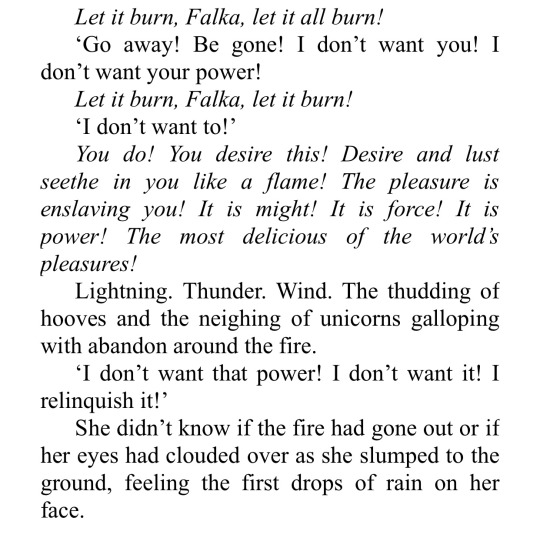
She makes an incredibly important decision to refuse destructive vengeful power.
The second thing that happens to establish her character at this point in the saga is she is being pursued by people who want to kill her and/or turn her into Nilfgaard. She is running and trying to escape. She is armed and gets a clear shot at a pursuer but again, sees a human face, and can’t do it. She shows mercy because her empathy will not allow her to see a persons face and kill them.
She is very lucky to survive that encounter.
She is a good, decent, human being.
But the story doesn’t leave us there. It gives us an ominous hint of the oncoming storm.
To get out of a life threatening situation, she joins a gang called The Rats. The Rats are a group of heavily traumatized war orphans who have been abandoned, raped, and abused and have banded together to not be alone. They’ve become murderers and no longer feel empathy for those they harm, but rather they take pleasure at killing others. She sees the look in their faces and identifies it as evil.
They adopt her. They protect her. Suddenly she is ‘safe’. Suddenly she is with others like her (war orphans with heavy trauma). Suddenly she is no longer alone. She is being offered a new identity (her old identity will get her killed at this point) She is them.
They also sexually assault her. (Cycle of abuse. I had to fast forward those parts. I’m listening to the audio and I can’t do that again)
But by the end Ciri has a new family. It’s the only option to her for survival. She finally manages to kill someone and takes the name Falka.
And as the return reader, you already know just how horrific it’s gonna get before it gets better. The feelings of doom. Ooof.
There is so much coming and if you’ve already read it, the dread is real.
It takes worse torture and assault than you can possibly imagine for Ciri to become the “teenaged killer” the narrative demands.
Because above all Ciri is like Yen. She is a survivor. She is angry. She has impulses for vengeance when she is harmed. All of these things are normal and human and can be given healthy outlets in normal situations. But this is not a normal situation.
So yeah I love her so much and the feelings of doom I have going into the next book are hanging over me. Of course it makes the bloody vengeance at the end that much more satisfying. But yeah.
And just to be clear I don’t judge her at all for anything she does during this “corruption” arc. I just don’t. She is surviving and no one can make me hate her ever. I’m an irrational person when it comes to her. And the her growth, her arc is one of the most satisfying I’ve ever read.
Most of us may not be war orphans being pursued by half the world. But the parallels to being an unprotected teenaged girl in a world that wants to exploit you, chew you up, and spit you out, is something those of us who came from abusive homes can understand. It is ultimately very validating and inspiring.
So I’ll be skipping the worst parts on audio. Some of them I just can’t do again. But I’m still obsessed with this story and I love my girl.
Ok thanks for reading my Ciri feels.
#the witcher#the witcher books#cirilla fiona elen riannon#thinking about the witcher books yet again#thinking about Ciri yet again
170 notes
·
View notes
Text
atla live action thoughts: episode 1
SPOILERS AHEAD
tw: opinions
things i liked:
love that we're starting from a hundred years ago and seeing exactly how everything played out. iirc in the original, sozin's first move was to colonize earth kingdom territory so the show expanding upon it in sozin making it seem as though he was about to attack the earth kingdom as a red herring so he could wipe out the air nomads instead was a good change
sozin being able to wipe out the nomads because they were all gathered in one place for a festival makes a ton of sense, and i really like that they let us have time with the air nomads before wiping them out. gyatso and aang's scene almost brought me to tears, it was so beautifully sincere and touching
whoever casted gordon cormier needs a medal because THIS. FUCKING. KID. i nearly lost it when he started crying like what do you mean this baby has to save the world???
i am so thankful that they didn't shy away from the savagery and brutality of the air nomad genocide. seeing the fire nation cut them down so ruthlessly was absolutely horrific, but it was the perfect way to start this darker iteration of the story and those ten minutes alone made me feel more for the air nomads than the entire three seasons of the original. and having the scene cut between aang lost in the storm and his people being wiped out???? insane.
the visuals are absolutely beautiful. i think they shot this on a volume stage and holy shit did they make use of it because every establishing shot was gorgeous, especially the one for the southern air temple
ian ousley, questionable heritage aside, is actually doing a great job as sokka. his comedic timing is excellent
the bending actually looks... really good. i love how they're doing the airbending in particular, it definitely feels as though aang is entirely untethered to the earth
katara's arc is... interesting. i'll reserve judgement on it till the end of the season but right now i don't hate what they're doing with the changes to her relationship with waterbending. we'll see where they're going with this.
initially i wasn't a fan of them changing katara pulling aang out of the avatar state, but after reflecting i love that it was the memory of gyatso that brings aang back to himself. the idea that even though gyatso is gone, his love for aang still lives on within him, protecting him, is remarkably powerful and moving. and i think at this point, this version of katara and aang don't have enough of a relationship for her pulling him out of the avatar state to have the same impact it did in the original
THE MUSIC IS TOP-NOTCH. ngl i teared up when the credits were the iconic sun warrior soundtrack mixed with the atla theme
things i disliked/am conflicted about:
aang running away... doesn't feel like it's aang running away. i know he had the scene where he's crying and upset, but it feels more as though he just wanted to clear his head for a little bit rather than fleeing in terror because he was afraid of the responsibility of being the avatar. his guilt over abandoning his people and the world is fairly important to his character, so i didn't love the way they did this scene because it doesn't really feel like an active choice that aang made
gran-gran being turned into into an exposition machine to tell the audience - and aang - everything. really wasn't a fan of her being the one to reveal that aang is the avatar, or that they info-dumped everything about the fire nation and the war in one scene. it also sort of took away the gut punch of aang finding gyatso's skeleton because he already knows what's happened, whereas in the show it hits so much harder because of his blind optimism and naivete leading up to that moment
RIP katara breaking aang from the iceberg because of her righteous fury scene, you will always be famous. live action katara feels a little too passive so far but i hope that'll change in upcoming episodes as we get further into her arc
dallas liu as zuko... mmm, something about it is not working for me so far but i can't put my finger on why. i wouldn't say i disliked it, but i'm not loving it either. his performance feels a little too theatrical, somehow? but it's only the first episode so again i won't be too harsh till i finish the season
the southern water tribe should look far emptier and more isolated to get a real sense of how the war has affected them, imo. here the impact of their parents and most of the adults in the village being gone doesn't seem as apparent as it does in the original when it's literally just a few women and children
overall, premiere rating: 7.5/10
45 notes
·
View notes
Note
Oh I am EXCITED to hear your thoughts about the war arc and the post-war arc because that's when everything went from decent to shit.
From random ass characters getting introduced and killed off
To the HORRIBLE confrontation of 1-A vs Izuku where it feels like Middle School all over again where everyone gangs up on him.
The mistreatment of Izuku where he's treated to be in the wrong for leaving even though it was to protect everyone.
To everyone basically gaslighting him.
To the HORRIBLE apology Bakugou gave which was more justifying his actions and victim blaming.
And not to mention the rushed Aoyama Traitor reveal and Izuku refusing to connect or relate to him because as we know as soon as he got a quirk, his quirkless past was erased!
You know, between how big this ended up being, and all the things I had to do, this response came later than I would have like. Hopefully it lives up.
Ah, The War Arc.
Also known as 'The point where everything went to shit'. Oh, those were the days. It's even worse because, as it was building up, The War Arc seemed like it was going to be awesome. It was where a bunch of plot threads, from Shigaraki to Hawks to Dabi's 'surprise' were all lining up to collide, and oh I, and probably others, were so excited to see it all go down.
Such naivety. Honestly, I think I blocked out so much of this beyond pure scorn that I had to reread it just to do this justice. If I seem particularly biting or sarcastic... that's probably why. This is basiclly me rereading and commenting as I go along, so it'll probably be a bit all over the place, before I move onto the post-war arcs which are still fresh in my mind.
Where to start, where to start.... well, the beginning works, I guess.
The LOV, after absorbing the MLA in a... kind of shoehorned way (Re-Destro basically ceased being a person after Shigaraki beat him, but for all that it's shown as, 'Wow he's so cool let's follow him!', I wonder if he surrendered just so his movement and army wouldn't be annihilated more than anything, and how he feels about all this, since he has no legs and seems generally depressed even though his stress has 'disappeared'. And wow, isn't funny that, if you just give up on everything you ever stood for or care about and your will to live, your sheer crippling depression would probably get rid of your stress temporarily?) becomes the PLF (so many acronyms!) and an army large enough to need a serious intervention, and so an army is needed to oppose them.
Thankfully, they get information from Aizawa's friend from the spin off manga to help figure out where everything is! Thank god they gave us flashbacks as this was happening to explain to anyone who didn't read it what the fuck was going on!
Sigh. Introduce your shit better, Hori, especially when it's some illegal move beyond science you're trying to sell us.
Anyways, that, combined with Hawks's information (back in those days where his arc was great), lets them get a grasp on the PLF and launch a two pronged attack on them, while also dealing with moles. All of this? All of this was actually pretty great, Kurogiri as the exception. Like I said, that build up was great.
Also, can I just add that Present Mic losing his shit was actually pretty awesome and hilarious? 10/10, would watch Crazed Mic again.
Anyways, here's one of the first things that, and maybe it's just me, is just kind of off: the fact that Garaki can duplicate Quirks. Not with a Quirk, or even with multiple Quirks, but just with science, somehow? I know that he's in the best position to do it, with AFO and vast resources to support him, but still; the closest to 'manipulating' Quirks like this, beyond OFA and Garaki himself, that we've seen in this manga? Is fucking Endeavor with his Quirk marriage. Quirks, in this story, are some black box bullshit that no one understands, and attempts to control them are on the level of Mendel and his peas, and often prone to failure to even get a 'basic' change happen (like, Bakugou was another 'basic' pairing, but he easily could have gotten something useless for heroics if he wasn't born lucky), and yet this fucker is just... so far beyond them it's OOC for the setting.
Everyone else is mashing lego pieces they can't see together to see if they fit, but this guy has copied Quirks, hundreds of them, and they just sit in jars everywhere? How? How?! In retrospect (and I'm kind of afraid of how many times I may say that here), his existence is just set up for the massive escalation that's about to come at us like a truck. How are there multiple AFOs active? How is Shigaraki's new body so strong? Where does the retroactively impossible rare old age Quirk come from, that was never a big deal before now because AFO had decades to hunt one down?
All of it? All of it is this guy. He's actually kind of interesting as a character, and a mad scientist fits AFO's organization to a T, but his purpose in the story is to hand out deus ex machinas for the villains on demand, and I honestly kind of hate him for it.
Meanwhile, Mirko bursts into the lab with Tomura in it and, ah, Mirko. In retrospect (seriously, someone count this and get back to me) this is the start of Hori just... ripping off all her body parts off like she's a cheap toy that he wants to see how much it'll take to break. At the time, I didn't think much of it, at worst it was a cheap way to prove how Serious Shit Was(TM) without killing off anyone named, but once it started happening again, while it just continued to focus on her in fetishy ways as she fights, it started to be a disturbing trend.
I've got some mixed feeling about her in general, because she's.... basiclly Bakugou? But with better limits on her behavior? Like, she's what the fanfic versions of Bakugou tend to end up as, somewhat cruel and crude and definitely violent but channeling it towards acceptable targets rather than, like, everyone around her. I actually like Blood Knight characters, but in this setting, as a hero, it just doesn't fit right, you know?
Still, she's a cool character and definitely deserved better than than being turned into a human stick for whatever kicks Hori seems to be getting out of it.
While I'm at it, let me mention that it's hard to take 'Super Strength Quirks' as a whole seriously sometimes if 'Rabbit' is enough for her to tear through the Semi-High Ends with some early Full Cowl level feats, and Endeavor can be punted through buildings and shake it off. In retrospect (fucking sigh) Endeavour vs the High End and Mirko's big Nomu fight were warnings that, yup, we're going all in on the power levels now, and it's kind of frustrating when, early on, they were trying to take the 'physicality' of Quirks seriously, that they were just human bodies plus this one specific thing, and now Hori's taking the seriousness of his own setting so loosely, just to make BIGGER, more DRAMATIC fights that last a lot longer than they should.
But I digress.
On a different note, while it was nice to see 1A given a time to shine, the fact that they're in this fight, the fact that some of them were essential members of this attack, is just wow. This, making so many of the adult heroes seem so useless that the need to depend on literal high schoolers, is in retrospect a big warning sign of just how accelerated the timeline became. In a more 'normal' situation for something like this, these big, dramatic fights would have happened years later, giving 1A the chance to grow up and make it all less... child soldier-y. There's plenty of shonen settings that have this kind of thing happen, sure, but they're always generally dystopian hellholes in the first place. Naruto the sixteen year old being important is a lot less of a reach when they put ten year olds in life or death situations on the regular anyways. MHA, though, is a modern setting, and they're in an actual, semi-normal school, where they get, like diplomas and shit and learn normal school things, rather than some military academy focused on pumping out ninjas or sorcerers or whatever to fight and die and kill for the cause. Which, UA kinda actually does anyways, but UA and how it doesn't actually make sense as a whole is really getting off topic.
So. Anyways....
OK, fine, Re-Destro being, like, the 'This is Fine' meme as a person is both iconic and deeply understandable and I wish we had more focus on that, but I need to focus back up on this!
Midnight's actual combat tool is a non-combat fan that exists just to fan the air. It kind of makes sense with her power but it's just so... shallow seeming, just playing to her fetishy theme, and I honestly think her doing this, fanning the air dramatically, is one of her more impressive showings in canon? I already know Hori has never taken Midnight seriously but still.
I've already talked about how wonderfully horrible the whole Twice Hawks thing was, so we're just going to ignore that and try to save some space....
Now I think it's time, so let's talk about one of the biggest issues of this arc: Shigaraki.
I've said it before, but him powering up makes sense, especially when he starts taking on the mantle of AFO's replacement. The problem is how much he powers up, and we can lay that at the feet of Garaki, Doctor Power Up, you jerk. He was always going to be one of the top beings in the setting once he got one of the most broken Quirks in the setting, but the fact that he can walk around without a Quirk active, blatantly ignoring all the people actively trying to murder him, refusing to simply kill Endeavor because his character is too important to write off yet, still incomplete and still be so dangerous...; in other words, the fact he effectively has several Quirks even without having a Quick is way too far. The heroes nerfing his development was an elegant solution to this problem, something that was handled a lot better than AFO, both as a person and as the Quirk itself, was. Even with Shigaraki escaping at the end of this, and making the 'final confrontation' energy of this arc fall completely flat*, the fact that he was permanently damaged by this still makes it have more meaning... you know. Until they tossed that out to fix him up anyways, somehow.
*This, actually, is one of the things that made the war so bad for me, actually: the build up was so... This Is It. There was all this hype for this being the Ultimate Fight, because if they don't win here, they'll have no way to meaningfully counter Shigaraki, he'd just be too hard to fight. Maybe if it was later, if Izuku was stronger, them losing could work: there would be a somewhat reasonable way out if they lost, involving a (probably bullshit) power up/training arc with Izuku frantically trying to even begin to match Shigaraki somewhere on his level as a 'transcendent one beyond humanity' before it was Too Late.... but him reaching his full potential at this point was years away, far too late to stop Shigaraki. It didn't sit right, because it was too early, but the way it was set up this was the do or die moment. Then the heroes lost, and that was the moment the story just... went to shit because Hori decided to solve the problem of Shigaraki being too strong by just making everyone else stronger as well.
And sure, a lot of it (most of it) is just Izuku, just Deku getting power up after power up, mastering them all near instantly when before each level of strength he gained was hard fought, requiring time and practice to being able to use them well, even with the new, largely out of nowhere addition of Black Whip, but it's also all the super moves everyone starts breaking out left and right in the final arc. It's Endeavour somehow beating AFO. It's all the big, increasingly dramatic and flashy attacks, all of them being no-selled by SFO because they're not allowed to be a meaningful threat. It's the one scratch on SFO by Bakugou (of fucking course) being, not because he's that strong (thank fuck) but because of some weird PTSD flashback on AFO's end. It's Deku, The Main Character, finally showing up and being the only person able to anything. That moment, in retrospect, is the moment when the power levels became the most important thing for a character above anything else, beyond strategy and planning, beyond how a power even works; any of it, all of it, they all paled before how strong is this character, how hard can they hit, how much damage can they take. It takes the idea of everyone being a hero, of the lesson Izuku had started to reject from the very beginning of the story, that people aren't born equal, being proved right all along, despite how the story trying to tell us otherwise.
That Izuku was only ever special because All Might graced him with his Quirk, and nothing else.
Oh. I can't believe I didn't mention that one second later retcon of Shigaraki awakening 'because of his hatred' instead of the far more reasonable electricity zapping him. With the delicious irony of it only happening because a hero was doing the 'heroic' thing of not minding his own business, no less; that would have been the cherry on top of the sundae of him coming back, as the perfect symbolism of how the heroes keep creating the villains they fight.
Don't get me wrong, his awakening itself is epic, you can almost hear the epic dark chorus singing in the background as he destroys everything, but... it's flashiness for the sake of flashiness, the way he officially wakes up. Not for any logical reason, but because his hatred is so immense it breaks reality, just like Izuku magically defies Nighteye's prediction, even though MHA pretends it's 'grounded' and that all it's super powers are biologic instead of anything more metaphysical that would help explain that off. It's just empty hype just for the sake of hype, no matter how little sense it makes. In this situation, it's relatively harmless, sure, but it's easy for it to become less harmless, like, perhaps, power ups just to make Shigaraki, Izuku, Bakugou, or whoever else is in focus at the moment look better, even if it doesn't make sense for them to actually happen. Or dramatic, meaningless 'deaths' and equally dramatic and ridiculous 'resurrections' that couldn't possibly result in a drastic increase in a person's abilities.
*looks meaningfully at the final arc's bullshit*
But surely, surely, Hori wouldn't do that, right? Right?
But anyways, back to the War Arc and... 'booty incoming'. Really. Really? Must we? Must we do this? Can't we have a woman on screen for five minutes without something sexual being referenced?
And then Bakugou's back, still speaking to everyone he can like they're trash, and still with people surprised by this, somehow, like this isn't a long established character trait for him, or that he would actually have any respect for old people. And then everything's being Dusted, people are panicked, and the heroes are full in crisis mode and yet his comment on the situation is "I'll wreck him". Not something about teamwork, not something about saving people, not even that he'll stop him, which has connotations of protection, but wreck, which screams aggressiveness and destruction. And it's just... so completely ignoring the seriousness of the situation, where everyone else is concerned about the city vanishing into dust, and Bakugou just wants to crush the enemy just to crush them.
It has all the energy of someone slapping their edgy OC into a scene by saying a meaningless line that can be somewhat reasonably ignored by the actual characters because it's so out of place. And then next chapter he just screams about killing Izuku instead of the actual threat when Izuku wonders why he's even there. Look, I get that, for some god forsaken reason, that Hori wants to play Bakugou's violent, abusive tendencies as 'comedy', but even if it was comedy, actually comedy and not thinly painted over abuse, there is a time and place for comedy, and this situation is not that time.
And, oh look, Eraserhead is finally fulfilling his true purpose: not being a teacher, but desperately acting as a bandaid to try and salvage the plot after Shigaraki contracted Madara Syndrome! And yet we still get shit like, 'The worst case is losing the teacher who watched over us all this time!' You know, the person who 'watched over you' by systematically destroying your ability to trust that anything he says or does isn't just another lie 'logical ruse', instead of the already unstoppable villain being even more unstoppable, because that is the context of the worst case scenario here, just so we're all clear: losing Aizawa would be worse than Shigaraki getting OFA.
(I mean, you could make a case that losing Erasure, the Quirk, is worse than him getting OFA, because Erasure can counter OFA so in that respect, Shigaraki getting it wouldn't change Aizawa's utility, but that's not the argument that's happening here; it's not Eraserhead, the tactical asset, the would be a loss, it's Aizawa the asshole of a person, who would be a tragic loss worse than OFA, the only hope anyone in this story has.)
Hori, if you could just throttle down the overhype of your Kakashi proxy and the angry fan favorite for five minutes while the shit gets real that would be great, thanks.
"If we can't stop one person, what is the point of this hero-saturated society?" You know what... Burning(?), that's a great question; I'm just going to leave this quote here on it's own merits.
And then Midnight is merced off screen by a meaningless mook, basiclly never to be mentioned again. You know, I didn't like how hollow her characterization was, but the answer to that is not to just off her and move on.
Meanwhile, Gran Torino is torn into by Shigaraki, but still manages to shrug it off. And, while we're on this topic...
Momo: is a genius.
Also Momo: makes a drug that is administered by injection instead of in a gas form.
Still Momo: doesn't think to make anyone else some extra knock out vial... things.
Still Momo: the sleep drug she makes take so long to take effect that this entire exercise is almost pointless.
Ashido: has the toss.
Also Ashido: fumbles the toss at the last minute out of surprise so that a man can do it for her, in a reversal of a situation that she had handled better before than he did, as an excuse to show his growth at her expense.
Classic Hori. Why let a woman actually be helpful when they can just try and fail to meaningfully improve the situation for the better?
And, ah yes. After just going on, with all apparently seriousness, about how he'll fight Izuku if he dares question why he's following him around, 'Bakugou Rises', and 'has his body move on it's own'. You know, heroically. Even though by all accounts he did and still does think and act on his instinct to just attack other people. And his dramatic 'sacrifice' is just going to be shrugged off and he's still going to be able to fight in anther couple of minutes. And, despite how it's presented like he comes to a big realization, he still acts exactly the same after this.
Riiiight, I buy that. Oh, and the person to notice something off about All Might's notes? Who was that again? Was it Izuku, who started off the series by analyzing Quirks a lot, and took the notes seriously, or is it Bakugou, who instantly insulted everyone in the notes off a surface level impression of them?
...Well. Now that the Bakugou simping portion of the war is finally past us, let us continue with Hori writing off one of his most interesting villains, just to replace him with the one he's refused to develop, just so we can start undoing all his wonderful development.
Thankfully, we come to one of the few parts I like about this mess: Dabi's Dance. Fucking glorious it is; the man is just vibing about the mayhem he's causes, the wonderful little psychopath. And let me tell you, 'The Past Never Dies' hits a lot harder than anything AFO has ever said.
Say what you want about him being a crazed murderer, beyond all hope of redemption, or blindingly insane? I'm not going to argue with you (though the story might, the way things are going) but you can't disagree with me about this: for all of his many, many flaws, the man understands Megamind's lesson about Presentation.
Oh. And Lemillion's back, I guess. If I seem unenthusiastic about it, well, that's about as much enthusiasm as Hori seems to have about that, so don't blame me.
Wait, the Bakugou simping is back on, or should I say, the Great Explosion Murder God Dynamite simping is back on. Fuck, Hori, remember what I said about a time and a place for comedy? Remember that?
Sigh... And the perfect place to end this clusterfuck of an arc off: 'You look like you needed saving', in reference to one of the greatest villains in the series, a mass murder who has spent the last five minutes trying to kill you, Izuku, what the fuck. But, it's over, right? Now that the War Arc is over, it can only get better, right?! Ha, if only!
Welcome to Post War, suckers: AKA, the point where Hori just stops giving a shit.
You see, for all the many, many, many flaws of the War Arc, Hori at least spent time on them, fleshed out dramatic moments, character reactions, and the lead up to those moments. But after? Hori has a checklist, somewhere, of all the major points he wants to do before the manga ends and he's checking things off, sure, but that's all he's doing: checking off the major plot points, one after the other. We've reached speedrun manga hell, where no character gets time actually think about anything anymore, or hold a conversation with someone that doesn't involve violence, or even break down in a proper hysterical cry.
Oh, look, a new character! What's that, an interesting character with deep ties to previously untouched worldbuilding you've been curious about? You want to know more about the corruption of the heroic society, or a country that isn't Japan for once?
Well, too bad, because they're gone. Where we're going, we don't have time for the current characters, much less new ones. If you see someone you've never seen before, enjoy your handful of chapters before they're thrown away like trash.
What's this? Izuku is finally getting some new character development? He's doing something new, different, and exciting, with potential to make him think about his future and heroism? WRONG! Class 1A can't have that! They're going to hunt him down like a dog for daring to leave them, and beat the living shit out of him to prove their friendship.
Just like Bakugou does! Good thing he's leading them, just like the old days in Aldera! And wow, that's some top tier Karma Houdini bullshit there, isn't it?
Pop Quiz: according to Bakugou, what does Deku mean?
Useless, you got it!
Next question: what does Bakugou still call Izuku, the same way he has since they were young, young children up to the present?
Deku!
How about this? How long has All Might actually interacted with Izuku?
Oh, maybe two years or so, you say? That's right!
During this time, has he ever once called Izuku either useless or Deku, beyond as his hero name?
Not once, correct!
So, taking all of this into account, final question: if Izuku considers himself Dek- I'm sorry, useless, what one person is the most reponsible for that?
All Might!
Hmm. Hmmm. Something seems wrong with that last answer. Gee, I wonder what seems wrong about that last answer, I'm so confused.
So, yeah, after Izuku leaves, not runs away, mind you, leaves, because UA isn't a prison and he has every right to leave, Bakugou explains how Izuku's complete lack of self respect is All Might's fault, before whipping all his classmates into a frenzy to go hunt him down.
Then, after finding him, already exhausted from constantly fighting for his life, all of them gang up on him, attack, try to knock him out, and after he gives up on making his own choices against the sheer amount of peer pressure being thrown his way, Bakugou apologizes.
For what? Well, if we didn't read the manga, we sure wouldn't know, because Bakugou didn't want to talk about that! No, it's just how Izuku, weak, helpless Izuku who idolized him, and had no Quirk, somehow made him feel inferior, and that's why he was so angry all the time. How dare Izuku have hopes and dreams?! And then we end it up with the absolutely touching message that this won't change anything.
Wow, Great Explosion God Dynamite. I'm moved. You truly are beyond us mere mortals, to know how an apology can only be truly sincere when you explain how utterly worthless it is! Brilliant! Truly, this is that Post War quality we know and love!
Oh, and the Traitor arc. Think back, everyone, back to the days where this manga was about being in a school, and think about the traitor that ratted out the class to AFO. Remember that? Well, it's Aoyama. What, the last chapter made you think it was someone else? Psych!
Anyways, Aoyama was actually the traitor the whole time, and it just... never came up again; AFO never saw a use for someone inside UA since they attacked the summer camp, I guess, and there's no possible way he could have used that asset again, no sir. Well, now that we've all yelled at him a bit, I guess we're all fine with that now; let's use him to ambush AFO! With loopholes to get around his lie detector Quirk! Surely, after giving him one Quirk to help him infiltrate one of the most important places in Japan, there's no way AFO could have planted, say, a second Quirk in Aoyama, as a way to deal with possible treachery; no we've never seen him do that recently. Or just observe him, or really do anything to make sure he stays loyal.
Oh wait, he was Quirkless? A dark mirror to Izuku, you say, both of which got a Quirk from two of the most important characters in the series, in a way that drastically changed their lives and tied them together antagonistically?! What does Izuku think about that? Don't you know better than to ask that kind of question; we don't have time to reflect on things, much less Izuku's Quirkless past that has basiclly been retconned out of existence at this point.
Was any of that too fast for you? Maybe too confusing? Did you want me to maybe break up that last section a little more, spend some more time on each major plot twist as it happened, how people felt about it? Well, congratulations, that's exactly what it feels like to read MHA Post War.
*screams in fury forever*
Hori. Hori, why did you do this to me? This story started off so good. What the fuck is all this?
#ask#bnha critical#mha critical#I didn't write this to show mercy#I think I have too many things I want to scream about#Everything Changed When The War Arc Attacked#This all looks even worse in retrospect#How may times am I going to say 'in retrospect' about this arc?#Let's find out together#This is probably going to be a mess fair warning#Dr. Garaki is Doctor Power Up#Please give Mirko some basic respect and also her limbs thank you#Izuku the person vs Deku The Main Character#plot not power levels#Hori's chronic lack of respect for women#bakugou critical#aizawa critical#Dabi understands Presentation#welcome to speedrun manga hell
127 notes
·
View notes
Text
Thoughts on The Bad Batch Episode 14 - Flash Strike - A Discussion Post
This episode had my heart racing and I still cannot grasp the fact that this is the second-to-last episode. Let's return to the pre-finale filled with surprising and heart-racing moments!
(SPOILERS AHEAD IF YOU HAVE NOT SEEN THE EPISODE YET! all screencaps from www.cap-that.com! https://www.cap-that.com/starwars/the-bad-batch/314/?page=1)
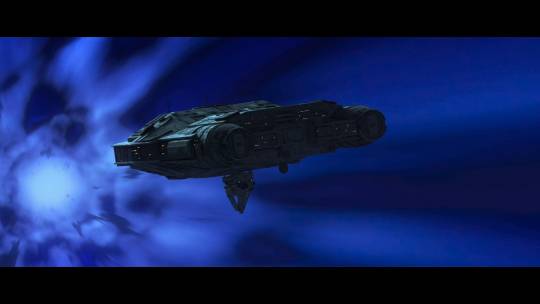
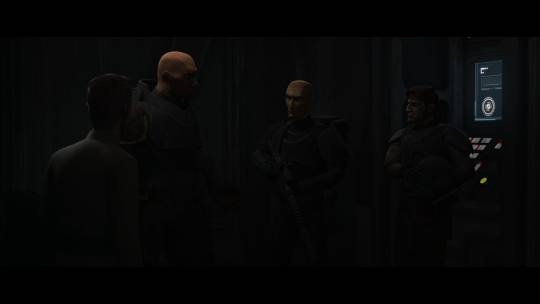
The boys and Rampart keep their shuttle attached to the Imperial ship that is on its way to Mount Tantiss, and the ship that Echo is currently inside of. Hunter plans to detach the ship and head into Tantiss, and they know that Echo will find a way off the ship safely.
It's so funny how Rampart has just been dragged into this mess and is on his way to Tantiss as well, as he likely never expected to get into this much chaos after the Batch got him out of that Imperial prison. He's probably preferring the prison now instead of going to Tantiss.
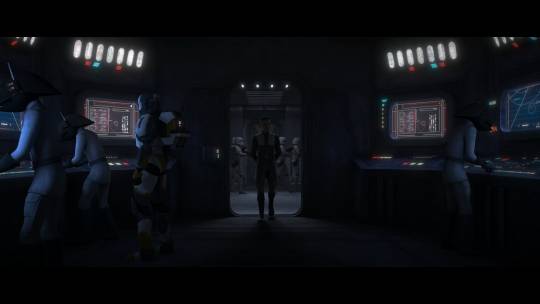
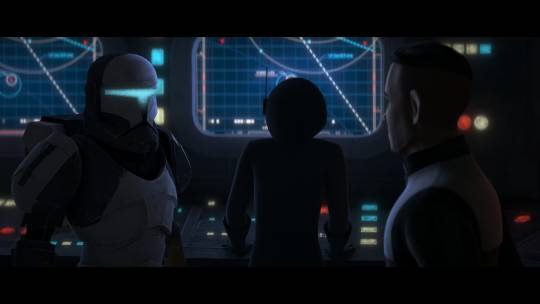
Hemlock enters the control room, inquiring about the status of the ship coming here. Scorch gives him word that the Batch had infiltrated the station on Coruscant with Rampart, and that certainly changes things. Hemlock orders fighters to launch into the airspace, preparing for the attack.
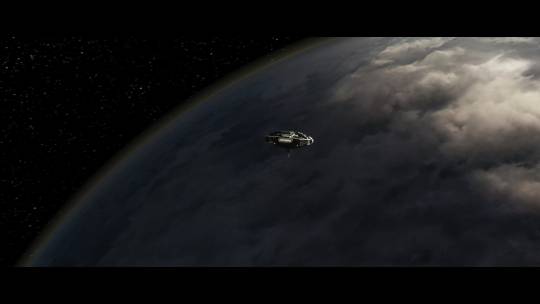
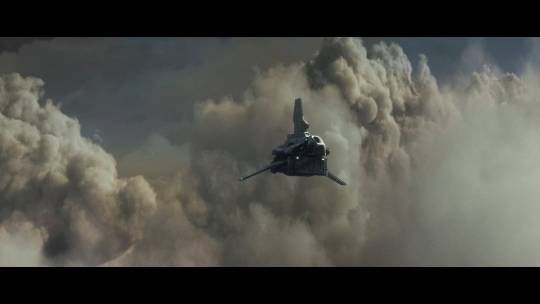
The ship exits out of hyperspace to enter Wayland (Weyland? It's spelled differently in Canon and Legends on Wookiepedia, and on the Star Wars website they spell it as Wayland), the planet where Mount Tantiss is located. Hunter and Crosshair pilot the ship in the front, detaching from the vessel and fighting the fighters that were sent out to attack them. The laser cannons attached to Tantiss start to attack them as well as Hunter pilots and tries to avoid the cannon shots.


The rumbling caused by the laser cannons are felt on Tantiss, and it was so cute how their little flat block structures broke because of the rumbling and Baryn (being the little playful baby he is) knocks over his structure and laughs. Omega feels the vibrations on the table and can tell that it is laser cannons. Emerie gets word that there is a security alert and she tells Scalder to watch the kids, which Scalder basically rolls her eyes at and says that they will be fine.
Omega knew that her brothers have come for her, and that just melted my heart.


The ship gets shot, and the boys and Rampart have to quickly get out before they crash land. Wrecker gets the cables out, and Crosshair and Wrecker go first, hanging off the ship, and they literally had me hanging on my seat in fear if any of them fell. Hunter jumped with Rampart (by jumped, I mean jumped and dragged him down to get him out because he wouldn't jump). Rampart's screams were everything this episode; shout out to Noshir Dalal for voicing him so greatly.


Hemlock sends out troops to find them, while the boys hide out in the jungle. It was hilarious how Hunter said "Unfortunately, yes" when Rampart survived, and Rampart heard him. For a second I really thought he didn't survive until Hunter said yes. The boys continue to head towards Tantiss, trying their best to be unseen.
I cried when Crosshair's hand started shaking again, he's so nervous to be back here.
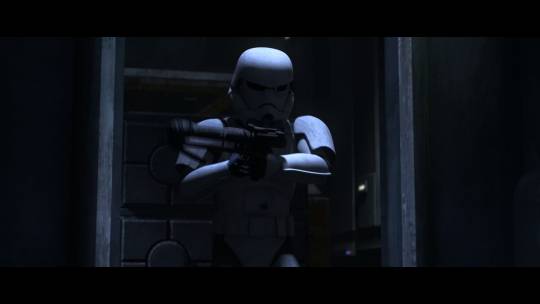
Meanwhile, Echo disguises himself in stormtrooper armor and steals a droid's hand, and I was so happy that he finally got a robotic hand. All the theories about Echo wearing white armor just like Fives was before he died in his arc in The Clone Wars is freaking me out, I really hope it doesn't come to that in the finale.

Eva wonders why their vitals haven't been taken yet today as usual, and Omega decides to go into the walls of Tantiss and figure out what is going on (she is literally living in the walls of Tantiss and Hemlock's walls, it's so funny). She tells the kids to cover her, who all have no idea what that means.
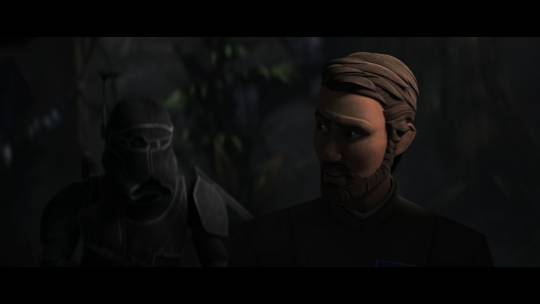
While venturing through the jungle, Rampart talks with Crosshair, comparing how he saw him in the Empire versus now with his brothers. Crosshair says that Rampart is like him after the Empire had betrayed them both and that he has changed, and Rampart suspects if he really has. He's really scaring me with how that line was delivered, but I'm just hoping that it means nothing and everything's fine.
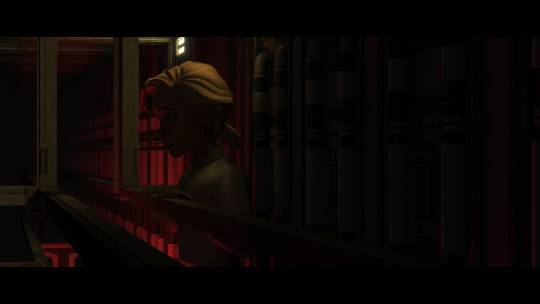
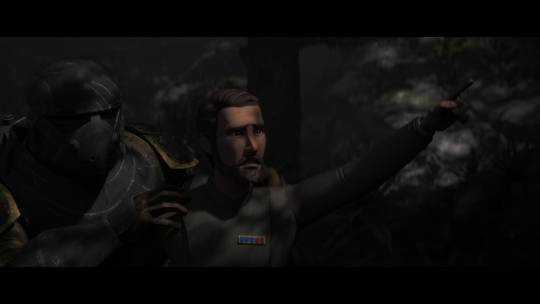
Omega carefully goes through the walls of Tantiss, trying to find out what is going on and any routes of escape. The boys and Rampart continue to navigate themselves through the jungle, while Rampart grows tired and lays near what he thinks is probably a rock. He rests near a large beast, as it awakens and Rampart starts freaking out, running away. The boys try to fight it without blasters, but eventually the blasters are used and their position is given away.
Rampart gets caught by the Imperials while running away, as he will likely be taken to Hemlock for questioning. I'm so worried that he will betray the Batch.
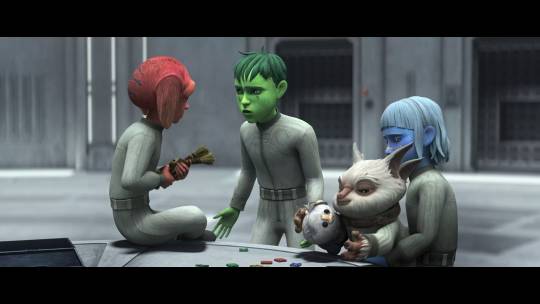
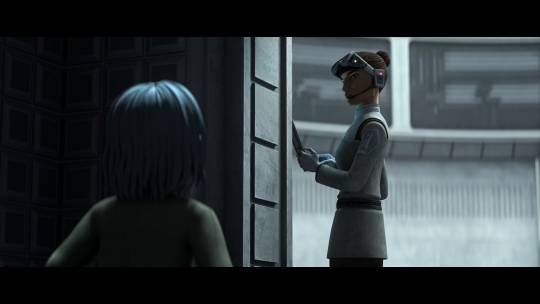
The kids try to come up with ways to keep Omega from being caught, as Baryn drifts off to sleep. Dr. Scalder comes down to take the kids' vitals with the usual droid, while Omega is missing. Sami tries to stall Dr. Scalder by telling her that she is still hungry, and Scalder replies, "It will pass." She was really willing to let the kids starve and didn't care; her and Hemlock are at the top of the list as the worst doctors on Tantiss. Jax asks if he can go next, but Scalder becomes frustrated with the kids, going in order and doing her job.
Luckily Omega managed to get back in time, acting like nothing happened.

While in the walls, Omega passes a room that holds a contained Zillo beast, likely the same one that the Batch had seen before. I'm so happy the theories about the ZIllo Beast being in Mount Tantiss's basement came true, and if the prayers about it eating Hemlock come true that would just be funny. I'm so ready for Omega to let it free and allow it to cause chaos on that mountain with the Batch watching.
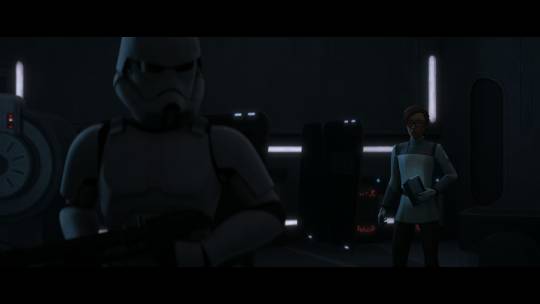

Echo gets in the room where the blood samples are tested, and views all the files of every clone on Tantiss, even Omega's. Emerie comes in and sees him in his trooper disguise, and Echo tries to lie his way out (and of course, we know that clones are unable to lie). Emerie manages to recognize Echo from what Omega has told her about him, and Echo gets to meet the Emerie his sister has always talked about. Echo gets upset with Emerie since she is playing a part in all of this, and Emerie says that she was just doing her job. I feel so bad for her and all the lies she's grown up with while likely growing up under Hemlock, but she's starting to wake up. Emerie tells Echo about the other children on Tantiss, and they plan to get them out. I'm so excited to see their dynamic next week.


Omega regroups with the kids, and the kids are happy to see that she is fine. The kids ask her if she found something, and Omega says that she found something big and is ready to get them out with a plan. She looks so ready, I'm so ready for my little girl to cause havoc on that mountain and make every doctor on Tantiss go insane.
I can't believe we're reaching the finale now, and I'll only have one more discussion to write. I'm so excited and greatly nervous for the finale, and I am so sad that this show is coming to an end soon. I'm hoping we can see CX-2 again, where did he go and please reveal your face! Still praying the finale is over an hour...
#star wars#the bad batch#tbb#sw tbb#the bad batch season 3#the bad batch spoilers#tbb s3#the bad batch hunter#the bad batch omega#the bad batch echo#the bad batch wrecker#the bad batch crosshair#the bad batch sami#the bad batch jax#the bad batch eva#the bad batch baryn#bad batch#star wars the bad batch#royce hemlock#commander scorch#edmon rampart#dr scalder#tbb spoilers
20 notes
·
View notes
Text
On Heteromorphs and Heteromorphobia (Arc XXI-B + Conclusion, Final War-B: The Hospital Attack)
To preface before I start documenting these final four chapters, there’s been a lot said (not least by me) about how wildly out of touch the resolution to this plotline is. While I didn't set out to rehash all of that again, it turns out I can't actually talk about how the series portrays heteromorphobia without talking about how it resolves it—if I'd wanted to do that, the place to stop would have been with the last post. This whole piece is also destined for AO3 eventually, so it needs to be readable for those who don't follow me on tumblr. Therefore, if you've been following my #heteromorph discrimination plot posts for a while, there are portions of this post that will be pretty familiar territory!
If you're new and want my full breakdowns, you can find them in my Chapter Thoughts posts or in this pair of posts rounding up the asks I’d gotten on the topic. Here, I will simply say that I don’t think Horikoshi’s fumbling of the plot can be read to mean that all the stuff I’ve documented thus far was just me reaching too hard, reading stuff into the manga where nothing was intended. While I’m sure some of it is—I definitely went out on a few limbs!—I think the main answer to, “How can heteromorphobia be such a well-thought-out depiction of a logically foreseeable form of discrimination while also having such a terrible resolution?” is, “Because the mainstream opinion about how best to handle discrimination is wildly different in Japan than it is in progressive American circles.”
That doesn’t mean I’m willing to wave the wand of Cultural Differences over this resolution and forgive everything—there were plenty of Japanese fans critiquing it as well![1]—but it does somewhat modulate my feelings about it. In any case, let’s get to it.
1: Most of what I saw was on Twitter, but there’s a Japanese site called bookmeter that’s kinda goodreads-esque, and which had several critical reviews posted for the volume, including one that felt like every point laid out was something I’d complained about as well. Super validating, but a shame it was necessary!
(I'll be changing up my formatting just a bit in hopes that I can find a way to present sub-sub-bullet points that tumblr won't choke on in this 13K post. Pray for me.)
Chapter 370:
O We open with a scene which we’re led to believe is about Spinner but which the end of the chapter will reveal to be about Shouji. It’s shockingly open about the extent of the discrimination Shouji faced, and there’s worse yet to come, but here we find people throwing stones at him, telling him to die, saying he has dirty blood that will defile the land, that he should stay inside the house, and that no matter how much time passes,[2] they will never accept “his kind.”
2: Viz renders this as “no matter how much society progresses,” but the word jidai means something more like “the times”/”the age,” and the progression term used can mean improvement, but in the circumstances, probably just means forward movement. I think the intention is more like, “No matter how much the times march on,” if only because it would be very odd for the people yelling this vitriol to frame it as themselves resisting progression. After all, bigots don’t typically think of themselves as “regressive” compared to everyone else’s progressiveness; they think of themselves as normal or valuing tradition compared to everyone else’s moral laxity/perversity.
So, remember how I talked about the spiritual/religious charge to the language the CRC used to talk about their “sanctuary” and the League/Spinner’s presence in it? Here’s the full scope of that. It’s about kegare, a Shinto concept of uncleanliness associated particularly with blood and death, and while that’s normally something that can be purified simply by undergoing the proper ritual cleansings, when something is, in itself, intrinsically unclean, no amount of purification will fix it; you can only keep it sealed away. Hence the yelling at Shouji not to leave the house.
The spirituality-based discrimination calls to mind the burakumin, originally an outcaste group of people who made their living working with all the aspects of life Shinto considered kegare—butchers, tanners, executioners and the like. They were made to dress and cut their hair in ways that identified them on sight, barred from entering temples or schools, and lived in their own villages. The laws mandating much of this were abolished in 1871[3] and urban sprawl gradually rolled over burakumin villages, turning them into slum areas. While today it’s not uncommon for people to not even know they’re descended from burakumin lineage unless they’re specifically told,[4] more subtle discrimination does endure. While it’s clearly not the only inspiration, there’s a lot about anti-burakumin bias that’s reflected in heteromorphobia.
3: Albeit not without considerable and violent protests against the liberation of the burakumin/the idea that they were henceforth to be allowed to hold other occupations and become ordinary citizens. Arson, destruction of villages, attacks and deaths—all things considered, the anti-Kaihourei riots are probably a decent place to look for inspiration on the historical massacres Spinner’s #2 will be talking about shortly.
4: Or find out because someone who knows the significance of those old neighborhoods finds out first and they’re suddenly on the bad end of some discriminatory act or another.
O We find out that the group Spinner’s leading consists of fifteen thousand people, that number split between PLF remnants and ordinary civilians who support the PLF’s cause. It’s unknown exactly how that split breaks down, but based on how the rest of the attack goes, I think it’s probable that the group is mostly civilians—if it were more PLF, it probably wouldn’t be so wholly defanged by Shouji’s big plea for peace. So that’s what we might call a “bad look,” that fifteen thousand ordinary civilians feel so incredibly hard done-by that they not only flock to join a known terrorist, but that they do so for the purpose of attacking a hospital.
O They’re opposed by about two hundred police and heroes, the relevant of whom for our purposes are Present Mic, Rock Lock, Officer Gori, Shouji, and Koda. With the exception of Present Mic, who will in any case be heading inside very shortly, they’re all minorities of some sort, with Rock Lock being very visibly, obviously Black, and the others being heteromorphs. None of them are immediately thinking about the composition of the crowd, but rather about how difficult the crowd is being to handle.
O Rock Lock yells out that the rioters are too organized to be some random mob, a dismissiveness that gets him shouted at by the Spinner fanboys—tragically their only appearance in all of this!—that, “Folks with human faces just don’t get it!” I have to assume that putting Rock Lock in this scene is no accident, but rather is there to make the rioters come off as short-sighted, so deep in their own pain that they lash out at someone who, if HeroAca!Japan is anything like present day Japan, almost certainly understands better than they think!
The phrasing, in any case, points towards the dehumanization that heteromorphs, especially animal-associated ones, are subject to. After all, as Re-Destro might point out, in the post-Advent world, isn’t it the case that any given heteromorphic human’s face, no matter how strange it may be, is de facto a “human face”? Yet the vitriol from the Spinner fans clearly reflects how internalized it’s become for them, that they don’t look “human,” despite the fact that “looking human” means nothing at all in the time of quirks.
O Koda gets called a traitor by an elderly beaked heteromorph from, apparently, a rural area, underscoring what’s been alluded to a few times prior to this, and which will be laid out explicitly in a few pages, that heteromorphobia is far, far worse in the countryside than it is in the cities. Mr. Beak assumes—correctly, it seems[5]—that Koda’s a city kid, because why else other than ignorance would a fellow heteromorph stand against them?
5: Koda’s from Iwate Prefecture, which is only above Hokkaido in terms of population density; a bit of research suggests that its largest city, Morioka, is considered to be a mid-sized city. So that’s definitely the hard upper limit on exactly how “big city” Koda could reasonably be. That said, Shouji also identifies Koda as someone who grew up in a city, for which I assume he must have at least some basis.
O Spinner’s #2 fulfills the promise of his early shorthanded characterization of being a fiery, well-spoken zealot by standing on top of a building over the mob and exhorting them onward with revolutionary, inflammatory rhetoric. And boy, does he bring up a lot to talk about!
Demagoguery for Fun & Profit
O Quirk counselling and quirk education? Phony nonsense, he says. That’s a fairly confusing grievance to bring up in this context, so let’s consider what he might have in mind.
• For quirk education, I would contend that BNHA has shown very little of it, in spite of having Academia right there in the title. The academics in question are about Heroics, after all, not quirks in and of themselves. Here’s the complete list of what I would say the reader has seen that could be qualified as actual education about quirks:
Aizawa telling the kids(/low tier villains at USJ) some broad generalities, things like a very basic explanation of how quirks work on the genetic level or how they’re classified. Most of this is delivered in the context of how his quirk works; the only outlier that immediately comes to mind for me is his explanation of how quirks are like muscles, and can be strengthened via training.
Mirio and Tamaki’s middle school class doing “quirk training,” which is framed as a P.E. class and is specifically aimed at finding ways for each kid to be “useful to society,” not about them learning anything about quirks in a broader sense.
Endeavor’s recent reference to Nedzu’s alleged “quirk morality education,” about which I have already registered my skepticism.
The bit in Re-Destro’s monologue to Shigaraki where he mentions he was taught not to judge others by their quirks. It’s hard to judge how applicable this is to normal society because Re-Destro was raised in a cult, and the book shown during this sequence was released by Curious’s publisher.
So of those options, what is #2 talking about? I’d say the last one is probably closest to what he means: don’t judge others by their quirks. But of course, people judge others by their quirks all the time. Family, classmates, teachers, people in the same neighborhood, heroes and police—we see examples from literally the first page of characters who are being judged by their quirks or lack thereof. While that judgement doesn’t apply only to heteromorphs, they are, by dint of their visibility, going to face it everywhere they go, regardless of whether any given situation—say, going to the grocery store or on a date—involves quirks or not. So, whatever lessons people in this society are getting about quirks and judgement, they clearly aren’t absorbing them.
It also bears pointing out, of course, that #2’s personal affiliation is with the Metahuman Liberation Army, and he definitely shows signs—as I’ll get to in a bit—of the quirk supremacism that group is so unanimously painted with in the endgame. So while the supremacy he’s preaching is about heteromorphs rather than quirks more generally, he could well be saying quirk education is phony because he’s all for judging people on their quirks! However, his criteria for that judgement differs from both forms of judgement taught by the society he’s railing against—what they practice and what they preach.
• Then there’s quirk counseling, a practice the story most prominently associates with Toga, who’s barely a twitch of the needle away from baseline (though her abuse is not wholly without reference to her appearance, in that her natural smile is repeatedly branded as scary or deviant). So why bring it up in association with heteromorphs? My suspicion is that a heteromorph—especially a heteromorph with an animal-associated quirk!—being visibly “different” in some way makes the people around them hyper-sensitive to behavioral “deviations.”
For a start, you see that hyper-sensitivity brought to bear against Toga. Curious contends that Toga’s sense of “admiration” was a perfectly normal thing, but it was the tie to blood that made it wholly unacceptable. It’s notable that, before she snapped, Toga was never shown to actually want to hurt people: the bird was already injured when she found it, her friend got a scrape the way any child might, Saito was involved in a fight Toga had no hand in. She hurts people now because a lifetime of rejection and dehumanization, but Toga’s admiration of blood was not intrinsically indicative that she’d grow up to be violent; people treated it that way because of cultural attitudes towards blood and blood-attraction.
So, might the same sort of thing be true of e.g. animal-associated heteromorphs? That they might exhibit behaviors which would, in different circumstances, be totally fine, but which they’re judged for unduly harshly because of cultural beliefs about the animal they resemble? Let me just spitball a few possibilities:
A cat heteromorph who, as a child, showed affection by nuzzling. That’s fine when a literal kitten is doing it, and funny and cute when a baseline child sees a cat doing it and imitates it for fun, but when the cat heteromorph does it, he makes people uncomfortable, makes them wonder if he lacks self-control, comes off as weird and too-forward. So his parents rebuke him and bring him to a quirk counsellor to break him of the habit, leading him to feel ashamed and alienated from a harmless natural impulse.
A snake-headed girl is the first heteromorph in her family line and the way she stares at people so fixedly, never blinking, creeps them out, makes them feel like she’s dangerous. She isn’t and has no intention of being so, but she’s sent to quirk counselling anyway and the lesson she learns is to just never look people in the eye at all.
A condor heteromorph develops a morbid interest in corpses in middle school. He doesn’t want to eat them, he’s not some kind of cannibalistic animal—at least that’s what he told himself before quirk counselling, where his counsellor, like his teachers, assumed that his interest had to be tied to animal instincts. He wanted to be a mortician, or join the police and get into crime scene investigation, but when he told people that they just looked at him like he was already holding a fork and knife. (He ends up getting into photography, and just has to live with the fact that now people have two excuses to call him a vulture.)
Two children—one with a plant-based emitter quirk, the other an eight-eyed spider heteromorph—are caught in the act of killing some insects by a local police officer. It’s the sort of innocent childhood cruelty you might find anywhere, and, indeed, when the officer calls their school about it, that’s what gets decided about the emitter—he was just a child who didn’t know any better. But the heteromorph gets recommended for quirk counselling instead—after all, spiders kill insects. What if this is an early warning sign for instincts towards predatory behavior? It’s important to nip these things in the bud.
That’s all off the top of my head or taken from some conversation with friends on the topic, and maybe it’s a reach, but it’s also a very plausible explanation for why a heteromorphic idealogue might bring up quirk counselling as a specific grievance—because, like the Villain-designation for criminals, it’s unevenly and unfairly applied.
O The next point #2 makes, and definitely the one that made the biggest splash in fandom at the time, is his invocation of a pair of historical incidents, possibly both but at least one of which was a mass murder targeting heteromorphs, carried out by a bunch of baseline types. He names them as the 6/6 Incident and the Great Jeda Purge. These are both stealth Star Wars references, though the former is disguised a bit better by being in the same format that Japan sometimes uses for naming events like attempted coups.[6] Given the image we see, it’s fair to assume the event in BNHA was similar.
6: See for example the May 15 Incident or the February 26 Incident, called the 5・15 Incident and the 2・26 Incident respectively in Japan. You see this in China as well, with the Tiananmen Square massacre being referred to there as the 6/4 Incident.
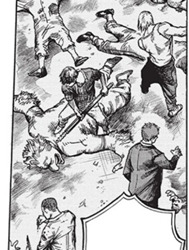
Notice that the perpetrators here are mostly holding weapons. Were they quirkless themselves, or were they avoiding using quirks such that they couldn’t be branded as Villains? Knowing the answer to that would give us a timeframe for this.
He goes on to declaim, on the basis of these events, that the history of the paranormal is one of persecution and oppression of those with “differing forms.”[7] The term in Japanese there is kotonaru katachi, 異なる形, which uses a different reading of the kanji in igyou (異形) and muscles in a verb conjugation, which has the effect of softening the harshness of 異 somewhat.[8] This would be a great catch-all term for those with heteromorphic bodies who might or might not have heteromorphic quirks[9] if it weren’t for the fact that literally the only person we ever hear using it is an anti-social zealot. No one on Team Hero ever makes this kind of distinguishment.
In any case, #2 is obviously over-simplifying to play to his audience—recall the baseline woman we saw back in that shot of Persecuted Early Quirk-Havers back in Chapter 59—but, as I’ve discussed extensively, being more visible does make one a more ready target. Also, of course, the presence of the CRC in the story lays the groundwork for this sort of historical horror story even long after the worst days of the Advent.
7: I provide my own translation here because the Viz one, “those who don’t fit the mold,” is vague to the point of uselessness.
8: The koto reading, as best I can tell, seems to be pretty rare, often tagged as archaic in words including it. The i reading is far more common, in words that denote wrongness, divergence, abnormality, and so on. But it may be less about the reading and more about the fact that adding the verb conjugation makes the term more of a descriptive phrase than a direct noun. As ever, take my talk about Japanese language minutiae with a grain of salt.
9: “Differing forms” is broad enough, however, that it could also be read as covering, say, people with amputations, congenital anomalies, or other sorts of non-quirk-related disfigurements from accidents or disease. As in real life, navigating the linguistic space between specificity and Othering can be tricky.
O Next, #2 rhetorically demands what excuse was given by those who perpetrated these slaughters? He answers his own question with the quote, “They give me the creeps.” Note how this ties in with my earlier suppositions about the likelihood of discrimination worsening the farther one is from baseline, as well as those about the necessity of putting up a good, positive, appealing front. It’s a perfectly intuitive leap, that more extreme variants of heteromorphy, or those who evoke negative associations—animals tied to rot or bad luck, people made wholly out of green ooze—are going to be more likely to be found “creepy” than those who look like e.g. sexy bunny girls or straight-laced guys who just happen to have pipes jutting out of their calves. Of course, that’s on something of a sliding scale; the more biased an area is against heteromorphs in general, the easier it will be to find oneself on the wrong side of that line.
O #2 presents the idea that society has reflected on their actions and made amends, or at least that’s how society’s narrative goes. Illustrating this, we see two of the three heteromorphs in the police force, as well as Nedzu. Interestingly, the panel does not include any heteromorphic heroes! I might guess that this is because heroes are meant to use their quirks to serve others; they’re really just enforcement tools, lacking any particular authority beyond a quirk-use license and some admittedly broad soft power courtesy of the social contract.[10] Conversely, a school principal and a police chief (Gori remaining the outlier here) have actual authority, such that the average heteromorphobia-denier can point to them as evidence that heteromorphobia doesn’t exist anymore.
10: Which is to say, I don’t get the impression civilians are required to take orders from heroes, such that they would actually get in legal trouble for disobeying. The fact that people do typically follow those orders speaks more to the power heroes wield via their association with the police force, as well as the general tendency of people to assume that someone in a uniform giving orders during an emergency is probably a professional whose orders it would be safe and wise to follow.
In the same panel, we also see a baseline guy palling around with a vaguely murine heteromorph dude (he looks more like a mascot suit mouse than an actual mouse, but he’s certainly nowhere close to baseline!), illustrating another way society wants to pretend it’s moved past heteromorphic discrimination. I can’t help but note, in regards to this specific pair, that the manga uses faces the readers know to illustrate the point about heteromorphs in positions of authority, whereas to make the point about baseline/heteromorph friendships, it has to make up a new pair to show us because the series hasn’t made the time to actually build any (heroic) relationships that actually look like that!
Now, one could argue that using familiar faces to underscore #2’s speech would imply that he’s aware of those faces, and while that’s fine for figures of authority, there’s no reason for him to be aware of e.g. Natsuo and his mousey girlfriend. However, the same would apply to anyone placed to demonstrate a random urban friendship crossing the “differing forms” line, including those two strangers. Who are those two, after all, that #2 is any more familiar with them than he would be of Natsuo and mouse gal?
Honestly, I think the best relationship candidate we have—a pair who would both communicate what the panel needs to communicate to the reader and who would feasibly be enough in the public eye to get pointed at for rhetorical purposes by an in-universe speaker—would be Kamui Woods and Mount Lady. Unfortunately, they don’t work because Horikoshi has never seen fit to actually reveal Kamui Woods’ real face, so they’re much less visibly “a baseline person being emotionally close with a heteromorph” than the random two Horikoshi made up.
O The oratory continues into discussing the divide between city versus rural views on heteromorphs, and this is, to me, the first clear sign that the series is beginning to lose the thread of this plot. Taking #2 at his word asks us to concede the heteromorphobia has been completely wiped out in cities, eradicated with that wonderful antidote called “education.” But discrimination very much does exist in cities! It may be less violent, less extreme, less vocal, but in the form of things like law enforcement bias, housing discrimination, microaggressions, the quirk counselling #2 himself brought up, it’s very much still there! Now, it could be that he’s just downplaying that discrimination to focus on the really ugly stuff you don’t see in cities, but I don’t know what his reasons for doing so would be? Not when there’s so much else he could say that would be equally inflammatory without alienating urban heteromorphs by dismissing their still very much present, modern suffering.
O He then brings up the talk of “light”—echoing Skeptic’s earlier rhetoric—and it not reaching those gathered at the hospital, so they must make their own, for people who’ve never once regretted the quirks they were born with can never be their heroes. What this primarily puts me in mind of is Hawks’s background with heroes prior to his father’s arrest—that heroes were only on TV, not present to save him in his actual life. Keep that in mind for Shouji’s response later on.
O Towards the end, #2’s speech finally tips over the line from what could plausibly be read as protesting unequal treatment to an outright call for supremacy. Notably, he doesn’t call for quirk supremacy, but rather for heteromorph supremacy—for the tables to be turned, the cards reversed, for them to not merely be equal, but rather to be superior.
It’s unclear how much of this he’s sincere about and how much is just convenient rhetoric disguising views that are more quirk supremacist in actuality. For many reasons, I want to read him in good faith: because the MLA originally struck me as being written in good faith throughout MVA and the first war arc; because #2 never once uses his quirk in this mini-arc, casting doubt on him having such an amazing quirk that he’d benefit overmuch from quirk supremacy anyway; and especially because it would be incredibly bad faith on Horikoshi’s part to make a character delivering a speech like this a total bad faith, manipulative outsider. Unfortunately, #2’s inner monologue in later chapters will make a good faith read all but impossible to sustain.
O Halfway through his speech, #2 unmasks himself, revealing both his face—dominated by four pairs of pedipalp-esque mouthparts, though the markings on his head are pretty eye-catching, too—and his scar. We’re never told how he got it, but the implication is certainly that he was attacked for his appearance. That may just be a conclusion it serves him to let people make, given his bad faith elsewhere, but thankfully the manga doesn’t go so far as to say that explicitly. In any case, his deliberate reveal turns his wound into a form of performance art, drawing attention to it, forcing it to be a part of the conversation—the polar opposite of Shouji covering his scars because he doesn’t want them to be a part of the conversation about him, and those scars being revealed because his mask is torn off against his will.[11]
11: This also fits a larger pattern of villains, by and large, choosing their expressions of vulnerability, making deliberate shows of agency in how their weakness is perceived by the broader world—Shigaraki taking his hand off for the first time, Dabi’s video, Toga approaching heroes with genuine questions, and so on. There are certainly exceptions, but generally if a villain shows his “true face,” it’s because they’re making a conscious decision to do so, and may be actively manipulating how that reveal is going to land. Conversely, heroes want to present a powerful, confident, untarnished image to the public, so their shows of vulnerability all have to be forced out of them after pitched battles or acts of violence. Heroes don’t make themselves vulnerable to the public on purpose, which feeds into the way the public then treats them when they are forced into vulnerable positions.
O Spinner’s a mess at this point, and the reason he’s a mess is all tied up in his faith in/desire to help Shigaraki. It’s not explicitly about heteromorphobia, but on the other hand, given that the thing that drove Spinner to be here at all was his horrifically low self-esteem caused by heteromorphobia, maybe it’s not so irrelevant after all. It may have taken Spinner longer than the Tenkos, Touyas, and Chisaki Kais of the world to reach the “fall victim to a dark influence due to the neglect and abuse you faced at the hands of Hero Society” plot, but he certainly got there in the end![12]
12: I call this The Sekoto Peak Problem, and it’s a big criticism of mine about how the final arc is framing all these conflicts as being solely brought about because Bad Faith Villain Men like AFO are scooping up vulnerable people and driving them towards violence, without acknowledging the much worse circumstances those vulnerable people might be in if they were just left to their fates. Touya, for example, if not for AFO’s timely rescue, would likely have simply died on the mountain long before Endeavor was able to find him.
O Shouji takes the mob to task for attacking a hospital without ensuring the safety of the uninvolved innocents within, a laughable bit of sophistry[13] that accurately foreshadows how disastrous his reasoning will be throughout the rest of these chapters.
13: It’s laughable sophistry firstly because the heroes knew this mob was coming but chose to leave Kurogiri at a hospital anyway; one can mount a very reasonable argument that Kurogiri’s teleportation power qualifies him as a military objective, which would make stashing him at a hospital an actual war crime in an international conflict, as well as negating the hospital’s protected status as a civilian object. It’s laughable sophistry secondly because it criticizes a Villain-led mob for failing to evacuate the building, as if said mob had exactly the same social cachet possessed by heroes, that they could freely walk in the front door of a hospital and start shouting evacuation orders with reasonable confidence that they’d be obeyed. Finally, it’s laughable sophistry because Shouji is quite simply wrong about the order of the actions he’s describing—the heroes’ evacuation of Ujiko’s hospital was concurrent with their invasion of said hospital, not precedent to it.
Chapter 371:
O Shouji accuses Spinner of taking actions that will set them back thirty years, which is just a really egregiously victim blamey sort of thing to say, placing the responsibility on heteromorphs for the crimes of those who hate them.
O Koda’s perspective gives us a flashback to Shouji telling his classmates about his history—his town and his scars and his reason for wanting to be a hero. It’s all material that works in the context of all the set-up we’ve gotten—the CRC and the religious inflection of their specific brand of hatred, the rural heteromorphobia, the hints about Shouji’s own discrimination, the attack on the Ordinary Woman, and so on—but that would have been far better served to have been integrated into the story more naturally. Koda has no specifically established relationship with Shouji (seriously, there is absolutely nothing; it’s shocking how out of nowhere his sudden deep dedication to Shouji is), nor does the scene he remembers have any specific flags for when it might take place,[14] leaving the memory feeling less like a natural extension of their arc than it is a graceless sequence muscled in to attempt to rouse some emotion in the audience when Koda has a quirk awakening he is not otherwise remotely in dire enough straits to have rightfully earned.[15]
14: Shouto and Bakugou being missing might suggest that they’re off at their remedial license course, which would put the scene somewhere in late September up through December (stretching from the aftermath of Overhaul to the introduction of the MLA), save that there are several other students missing as well—Sero, Iida, Sato, and Aoyama, none of whom where in the remedial course.
15: Nearly every other inarguable quirk awakening[※] we know of in the series has as a chief component serious physical injury: Bakugou, Ochaco, Toga. Geten’s is the only exception, and his is tied to the strength of his feelings for Re-Destro, which are clearly and overridingly his most significant character trait! Shouji is not anywhere near that central to Koda’s life, and he sure as hell isn’t injured enough to have gotten it that way.
※: By which measure I exclude stuff like the change in Shigaraki’s Decay or Mina’s acid attack against Gigantomachia. Shigaraki was explicitly just breaking through a mental block to access power he already had. Meanwhile, if Mina’s Plus Ultra moment had been a sudden quirk evolution, she wouldn’t already have an attack name picked out for it, nor would her horns have gone back to normal after it. Acidman: ALMA is an Ultimate Move, not Mina having a quirk awakening.
O The flashback itself calls for another subsection.
Ignoring the Difference Between the Personal and the Systemic for Fun & Profit
O The big thing here the description of the whole town coming out for a “blood cleansing” whenever Shouji touched someone. This is depicted as Shouji, probably a preteen in this sequence,[16] being savagely attacked with farming tools, the most visible of which is a pitchfork. This visual, as well as #2’s invocation of historical slaughters, is the darkest heart of heteromorphobia: a child being ritualistically assaulted in the open street as a matter of course, as a consequence for touching someone. This is the image you should hold in your mind as The Problem through all of the potential answers and responses that get trotted out through the rest of these chapters.
16: Visibly older/bigger than, say, Kouta, but also visibly younger/smaller than middle school Deku.
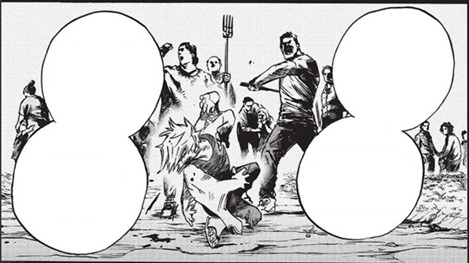
Before moving on, I do want to examine this image in just a bit more depth.
This is, firstly, the moment that Shouji got those scars, and it’s very important to note that what we’re being shown is likely not a random, representative sample of what the town “coming out in force for a blood cleansing” looks like. The strong implication is that this is in the immediate aftermath of the sequence we’ll see shortly of Shouji saving the girl from the river: he’s wearing the same clothes and shoes,[17] he’s the same size, and there’s a spray of blood from where he’s being struck across the mouth where he didn’t have his distinctive scars when he saved the girl. Does that mean the blood cleansings were typically not this violent? That’s hard to say. On the one hand, we don’t see any other scars on Shouji, and he wears his arms pretty bare! On the other hand, we never see any part of his body bare except his neck and arms, and since he can regrow his arms,[18] they’re not exactly conclusive evidence that he’s never been scarred there. Also, he does say talk about his situation—the scars he bears—as something other children in the country have to bear, suggesting that the norm is rather worse than a little symbolic gash across the palm or something!
17: In fairness, he may not own very much different, as I’ll discuss shortly.
18: The duplicated ones, at least. I seem to recall reading once that he could regrow the base set as well, but I’m still working on tracking down a citation on that.
Secondly, as was the case with the image of the historical massacres, the adults here are using tools/weapons in the assault, not quirks. As I mentioned in a footnote last time, them not using quirks to carry out this attack makes them merely criminals, not Villains, and therefore not nominally a Hero’s job to deal with. While I can’t imagine any Hero in the manga these days would stand back and let this go on, the absence still stands out—no Hero is participating in this, nor observing from the sidelines, nor trying to intervene. Heroes simply don’t figure into this picture at all.
Thirdly, we can see a few children in the background, both there with adults, I assume their parents. The child on the right is a passive observer, clinging close to their mother and simply watching; their father has one hand supportively on their shoulder. Neither parent seems distressed, insomuch as we can tell from their somewhat indistinct features and rather clearer body language. The child on the left is being actively held back by their mother, who’s standing with her back to the violence, her body interposed between it and her child. The kid is reaching out towards the scene, but it’s unclear what the intent is. Are they trying to intervene or do they want to join in?
Neither child appears to be the little girl Shouji saved—the one on the right is dark-haired, and the one on the left—the more likely prospect just going by the body language!—is wearing a long, dark T-shirt instead of the little girl’s overalls. I suppose the left one could be the little girl if we assume she was hustled out of what she’d been wearing by her parents, eager to get her out of now-tainted (and also soaking wet) clothes and into something dry and warm and, in more ways than one, clean. However, that seems like the sort of thing that would take longer than what looks to have been a pretty impromptu, disorganized bloodletting, unless everyone just held off on assaulting Shouji right out on the street until the “victim” could be present.
Finally, there’s the pair of adults right at the center of the background. If anyone in this picture is actually related to Shouji, I’d put money on them being here, watching but not attempting to intercede. I don’t think it’s conclusive, though; the woman is thin and hunched, making her look older—I’d guess Shouji’s grandmother before Shouji’s mother. That hunched posture and her hands being raised to her mouth do give her the most obviously distressed appearance of any of the adult, though, to the extent that the person with her is focused on supporting her rather than watching what’s going on in the foreground—and forward attention is what I’d expect if the dark-haired figure is related to Shouji.
So that’s the image we have of the crowd—actively taking part or observing with varying degrees of reaction running from distress to indifference to, potentially, enthusiasm.
O Next, let’s talk about Shouji’s parents. He implies they were baseline—at the least they were significantly more baseline than Shouji himself, as they lacked arms “like his.” That makes it quite telling that Shouji’s parents are nowhere to be seen in his story beyond the simple mention of how they were different than him.
Now, I don’t want to suggest here that Shouji’s parents are completely irredeemable people. While I would imagine that—at least initially—they shared their town’s bigotry, having a heteromorphic child themselves would have exponentially increased the hardship of their own lives. In a town like that, I’m sure that many if not all of their neighbors must have come to regard them with suspicion of wrongdoing or transgression—recall the first page of the last chapter, where Shouji is accused of tricking the town in his having brought dirty blood to it. Hie parents almost certainly lost friends and likely became ostracized themselves, and ostracization in a small Japanese town can be a horrifying thing to deal with.
And yet, even with all that being the case, they didn’t abandon Shouji or give him up; they didn’t commit family suicide with him.[19] Assuming he wasn’t removed from their custody after the incident, they’re presumably paying his school and living costs;[20] likewise, unless he just ran away from home or is carrying out an incredibly elaborate deception about what school he’s attending, they almost had to support his desire to attend a hero school to begin with. In his situation, parents who support his desire to be a Hero is a big fucking deal. After all, between the winning and the saving, heroes will de facto be touching people all the time! If Shouji’s parents still live in his hometown, how do you think those people will take it when someone first realizes the Shouji family sent their kegare-riddled monster off to be a Hero?
19: The history of honorable suicide in Japan casts a very long shadow, and when it’s combined with the meiwaku culture, you get an underreported epidemic of things like parents who can’t see their way out of a bad situation taking their lives and their children’s as well, so as not to leave messy loose ends that others will have to bear the burden of dealing with.
20: I won’t get into whether or not the U.A. students’ parents are paying for any given thing on the following list, but here are some potential costs to consider, assuming that Shouji, like Uraraka, was commuting from an apartment prior to the dorms being implemented: tuition, school uniforms, textbooks, school supplies, school meal plan, food not served at school (e.g. breakfast and dinner or meals when the school is on break), non-uniform attire, personal care and hygiene, housing and transportation costs, a measure of spending money for unanticipated expenses or culturally expected gift-giving, etc.
All that being said, it’s obviously not a glowingly loving relationship, either. Think back to Shouji’s absolutely barren room in Chapter 99 and consider it in the context of the information we get in this chapter. Is he really so ascetic by inclination, or is he just used to making do with as little as possible? After all, it goes without saying that if him coming into contact with someone called for blood purification, anything he himself was in regular contact with was also to be considered incredibly impure. That includes his clothes, personal belongings and living space; even setting aside his parents’ view on it, who in his hometown would even want to provide or sell things to the family that they think will go to the child with the dirty blood that’s defiling their land?
Shouji’s parents’ absence is also glaring in other ways. For example:
They’re either not in the beating scene image above at all or they’re that central background couple hanging back and just watching; whichever is the case, what they’re assuredly not doing while their son is being beaten so badly he will still have glaringly visible scars years later is “trying to stop the violence or take the blows themselves.”
Shouji says he has one single good memory about his body, but his parents are nowhere to be found in that memory. Ergo, his parents have not given him a single moment of positivity about his heteromorphic form.
Parents of U.A. students were evacuated to U.A.—not just the ones near it, but even ones like Uraraka’s parents, who live at least a two hour drive away, in a wholly different prefecture with a third prefecture in between them and U.A. Every student we see in the departure scene in Chapter 342 is shown with their parents except Shouji.
To sum all that up, Shouji’s family situation is not maximally bad, but it’s certainly proximally bad.
O Next, we get Shouji alleging ignorance on the part of heteromorphs raised in cities, that there are still parts of the country in the modern day where stories like his happen.[21] It’s a milder version of the same assertions made by #2 and the beaky heteromorph last chapter, in that Shouji doesn’t suggest heteromorphobia doesn’t exist at all in cities, simply that there are extremes of violence that can only be found in the country. It still feels off, however, to suggest that absolutely no one else in Shouji’s class might ever have heard of this through any channel at all: being from similarly small towns, reading about an attack in the news, reading about factors that impact the public approval ratings for Heroes, going through a morbid phase in middle school and researching it, being talked to about it by their parents, etc.
21: The suggestion of the Viz translation of this suggests that city-raised heteromorphs do know this, but only because they’re read about it in textbooks. My sister-in-law, who does professional translation, tells me this was a subtle mistranslation of the original text, however; the textbook framing is supposed to imply a remove of time, not merely of distance.
It’s not as unrealistic a story beat here as it would be in an American comic, as Japan does tend more towards using silence as a weapon against bigotry—children won’t learn what they aren’t taught, and similar reasoning. Still, to portray the class as so unanimously ignorant reflects a deep incuriosity, be that in the kids themselves about the world around them or in their author about how the knowledge/perpetuation of discrimination spreads.
This is particularly the case when you consider the story’s handling of the Ordinary Woman—attacked in her own town because people were suspicious of a heteromorph out after dark, turned away from multiple shelters because of her heteromorph status. It’s certainly true that things got worse for heteromorphs after the first war arc, but for discrimination in that specific form to emerge, there needed to be something for it to draw on. The fear of villains and the association of villains with heteromorphs are the foundation for the upswelling in anti-heteromorph sentiments in cities.
O Mina’s reaction to all this is one of rather theatrical anger. That is, no one around her takes her broad declarations—that the world would be better off without the people who hurt Shouji—as anything more serious than hyperbole. This is, it would seem, the only sort of anger that’s acceptable to show in response to hearing a story like Shouji’s—empathy to the wronged, sure, but no real intent to confront the wrongdoers.
O Mineta stares into space for a second before emphatically apologizing for calling Shouji an octopus once—a call all the way back to his microaggression in Chapter 6!—and asserting that it wasn’t his intention to say Shouji was gross or anything. Shouji responds gracefully, saying it’s “only natural” that his arms would make people think of octopus.
He doesn’t go on to say, “But that doesn’t mean people have to say it out loud,” but it’s possible that Mineta’s apology is meant to suggest that regardless. At least, one certainly hopes this isn’t the author’s way of quietly absolving his more popular characters of all the times they’ve done the same thing! It’s notable, however, that none of the other Class 1-A kids that have done this are in the scene. Shouto and Bakugou, who have both used that kind of language in anger (and in the latter’s case, also just with no provocation whatsoever) are the missing elephants in the room, and even Sero, who was the actual person to call Shouji an octopus, is, in his absence, Sir Letting The Gag Character Handle This Apology So I A More Serious Character Don’t Have To.
O Shouji brings up the Heroes Who Look Like Villains rankings. We know the Number 1 on that list is actually Endeavor, per a movie bonus booklet, but bringing it up in this context does implicitly confirm that said rankings have an unseemly slant towards heteromorphs, and what did Skeptic say about Villains and heteromorphs again…?
O Shouji says he wears the mask because he knows that if people see his scars, they’ll wonder about them, and fear he’s out for revenge. He doesn’t want people to think that, so he covers them up. He’s praised for this by Tokoyami, and the narrative pretty clearly also thinks it’s admirable and cool. I have serious issues with this—chiefly that it’s prioritizing the oblivious comfort of the baseline citizens over the fellow feeling and affirmation of other persecuted heteromorphs—but I’m also curious to see if the mask will come back now that its meta-narrative purpose of hiding Shouji’s scars from the reader has been fulfilled. I note, for example, that Shouji is not wearing the mask in the color spread for Chapter 394, and the color art does have some precedent for being an early predictor of stuff in the body of the manga.[22]
Incidentally, while I’m talking about Shouji’s mask, I do wonder how effective it would even be for him to cover his scars up? I have my doubts for two reasons. First and most obviously, heroes are such celebrities, all over the news all the time, such that if Shouji really does get as popular as he intends to, there will be people who want to know what he looks like.[23]
22: The big one is Aizawa’s eyepatch. It showed up in two pieces of color art (the popularity poll results spread for Chapter 293 and the new art announcing the BNHA Drawing Smash Exhibition) before it was revealed in the manga. Both pieces released within days of each other in early December, 2020, three months after Shigaraki raked his hand down Aizawa’s face during the war and almost two months before the latter showed up in bandages in the hospital, with another two months to go beyond that before the eyepatch itself made it to the manga in late March. In a more stealth spoiler, the same popularity spread revealed Shigaraki’s blackened, burned face-hand two chapters prior to Spinner digging it out of Shigaraki’s pants. The 394 spread is also my basis for asserting that Mina’s horns have gone back to normal after her attack against Gigantomachia, compared to Shouji lacking his mask and Koda having his new horn in the same spread.
23: Edgeshot’s character profile page notes that his fans are split into two factions: those who’re mad to see his real face and those who think the mask is what makes him cool.
O More importantly, though, heroes have to be licensed, and Hero Licenses are photo IDs. Photo IDs don’t typically allow face coverage because not being able to provide a visual reference to what the bearer looks like defeats the whole purpose. While we don’t know what full-fledged hero licenses look like to say if they’re taken in or out of costume, we do know the provisional licenses the students carry showed them in their school uniforms, despite the fact that they definitely had working costumes by then:
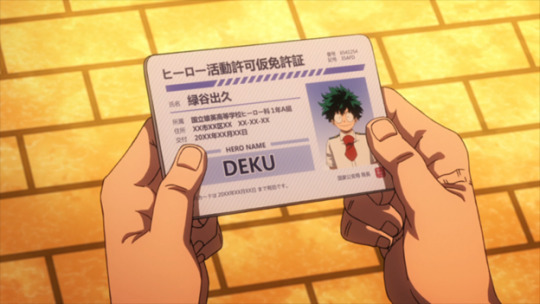
Pardon the sudden screenshot. The manga has this shot, too, but the anime fills in the details of the text a bit more.
It seems probable to me that the photo on a Hero License must show the bearer’s face, so that if they’re tooling around a crime scene and a cop who hasn’t seen them around before asks for their license, it can reliably be used as a form of identification. (I wonder how Hagakure manages?)
Also, think back to the press conferences we’ve seen in the story, most recently the one post-war: at every one, the heroes are in serious, solemn black suits, not their costumes. So at any press conferences Shouji ever has to speak at in the future, he’ll have to show his face there, as well.
O We see a direct flashback to Shouji saving a little girl from drowning in a choppy, swift-flowing river as he says in voiceover that he’d rather cling to the single good memory related to his body than dwell on the bad memories. He very much uses his quirk to do it, with his right set of limbs used to hold onto the bank while his left ones reach out to the girl, extending out another few “nodes” of arm-length when he at first can’t keep hold of her fingers. As they sit and catch their breath afterward, the girl clings to one of his tentacles and cries. This is not quite what his entry in the Ultra Analysis databook was hinting at[24] when it said he wears the mask due to his scary face making a little girl cry; that’ll be next chapter.
24: My apologies for not bringing this up before; it’ll be covered on AO3. The gist is as detailed above; the databook came out circa the Endeavor Agency arc, so this was a known factoid about Shouji by the time this chapter came out three years later.
O Wrapping up the flashback, we’re left with Koda’s memory of Shouji saying that he knows it’ll take longer than a generation to tear down a wall that’s stood for over a century, so, just as previous generations have done, he’ll keep paying it forward, being the coolest hero the world’s ever seen, “to give good memories to generations to come.” Which sounds really nice when he says it that way, as opposed to the broader implication that people whose children have been or are in danger of being maimed by bigots should just keep their heads down and “keep paying it forward.”
The whole “be a cool hero and give good memories” bit is particularly egregious to my eye, for a few reasons.
How much good did cool heroes do for Takami Keigo when they were just on TV? Which is where Shouji will be, because in order to be “the coolest hero the world’s ever seen,” he’s going to have to be at the top of the rankings, and being at the top of the rankings means prioritizing cities, which means all those heteromorphs out in rural areas are never going to see him in person. And anyway, what’s stopping all those bigots from just changing the channel or going on a rant about Woke Mutie Agendas every time a heteromorphic hero crops up on TV?
How much did the visibility of previous generations’ cool heroes do for Spinner? Does Shouji think Spinner was super inspired and uplifted by seeing e.g. Gang Orca on TV using the emitter-like hypersonic waves his quirk gives him to beat up Villains, an undue percentage of whom are also heteromorphs?
It’s certainly nice that Shouji was inspired enough by heroes on TV to want to emulate them, but he is demonstrably not the norm when it comes to wildly disadvantaged and victimized heteromorphs. Also, I have to wonder how much his admiration of TV heroes would have done him if he’d gotten to the girl just a little later—say, in time to get her out of the river, but too late to be able to save her life without knowing CPR. As bad as it was for him when he saved a little girl but had to touch her to do it, can you imagine how much worse it would have been if he’d touched her and then failed to save her, being found or having to walk back into town with her body?
I realize that's incredibly dark, but it's the kind of question that presents itself when the story is so insistent on Shouji's exemplary behavior being the model for heteromorphs to follow in their own lives.
O Exiting the flashback, when Shouji calls out to the heteromorphs, we finally get a straight-out look at how disastrous this conclusion is going to be in the way he shouts that no, the people who hurt them weren’t justified, but that there has to be a better way, that they should think about how to use their rage—but offers exactly zero suggestions himself for what that better way might be, or what they should be using their rage to do instead.[25]
25: I have seen the argument put forth that Shouji is one (1) teenager, and one (1) teenager cannot fairly be asked to Solve Bigotry. To this, I would counter that if Shouji doesn’t have even one (1) single idea to offer, why is the camera lens holding him up as the hero who quelled a fifteen-thousand-strong mob with only words? He doesn’t have to Solve Bigotry, but if he’s going to be used as a counter for other peoples’ misguided but at least active attempts to address the problem, he needed to be better than a mere white knight for the status quo.
Spinner’s #2 calls Shouji out on this directly, saying that if the situation were that easy to resolve, it wouldn’t have come down to this, and accusing Shouji of having no feasible solution to offer, just childish and naïve egotism. And call me a hopeless MLA Stan and you’d be right, but truly, where’s the lie?
His efforts in this regard, however, wind up pushing Koda to what certainly has all the markings of a quirk awakening because it upsets Koda to see Shouji being “mocked.” Man, sure is a good thing quirk awakenings are just a dime a dozen and definitely don’t require life-threatening injuries and/or incredibly severe emotional distress over someone who means more to you than your own life, right?
O In a last little stroke of ugliness for the chapter, Spinner calls Shouji gross. Just to, you know, make it really obvious that the villains are all totally bad faith representation for this cause and thus can be safely dismissed. (Christ, I hate these chapters.)
Chapter 372:
O We get the flashback of Shouji and Koda asking All Might to assign them to the hospital defense group. Points of note:
Neither Shouji nor All Might can be bothered to use the Ordinary Woman’s real name, instead just referring to her by her size. Seriously, I get the intent behind insisting that she’s just an ordinary woman, that there’s nothing in particular stand-out about her in the current age; it’s pretty much the same deal as Shinomori saying that OFA can no longer be wielded by an “ordinary” person, with that phrasing being used to ironically emphasize that quirks are now seen as ordinary, while those without quirks are the unusual ones. However, it obviously wouldn’t work in-universe for characters trying to specify who they’re talking about to say, “That ordinary woman,” with the end result being that they have to grab for what stands out about her if they want to be understood—in this case, her obviously unusual height. In trying to emphasize that she’s normal, Horikoshi forces his characters to define her by what makes her stand out.
Koda says that if Shouji’s going, he is too, a moment that would really land much better if they’d had literally any interactions of note at literally any point prior to this exact moment. Frankly, even last chapter’s flashback is pretty thin on that front, since Koda is not one of the students who gets speaking lines when cuddling up to Shouji to comfort him. (I’m not even convinced it’s very in character for Koda to be one of the kids diving in for cuddles—he’s usually pretty shy!)
Shouji says that he could never call himself a hero if he were to stand back while the hospital attack plays out, implicitly emphasizing the role his reaction to his own oppression plays in his heroic motivation.
O Another flashback[26] gives us Koda’s mother discussing the possibility that he might get horns like hers someday, and what those horns can do, as well as mentioning that she used to have to put up with considerable mistreatment herself, and, lastly, telling her son to grow up into a man who gets angry when people mock those dear to him.
26: The sheer number of them crammed into this mini-arc really says a lot for how rushed it is, but complaining about the structural problems of the last few arcs would be a different essay.
Breaking those down, we’ve got:
The fact that Koda’s mom says he might grow in horns like hers suggests to me pretty strongly that her own horns are a quirk evolution she just doesn’t have the language to name as such. If it were just a matter of maturation, something that came in with puberty, there’d be no “maybe” about it. Given what we know about the context of quirk evolutions elsewhere, this in turn suggests that she did not exactly get her horns under peaceful, wholesome, uplifting circumstances!
This is backed up by her mention of the “real cruelty” she faced. Interestingly, this kind of raises some questions in relation to Shouji’s assertion last chapter that people like Koda who grew up in cities lack an understanding of the extremes of heteromorphobic violence that endure elsewhere. Did Koda’s parents move to the city from the country at some point when Koda was young/before he was born, and the “real cruelty” was out in the country? That might track with the overalls she was wearing. And of course, Koda’s mother was a younger woman then, so maybe it’s just the fact that heteromorphic discrimination was worse at the time. Either way, Koda’s mother is clearly open with him about the fact that she was mistreated because of her appearance, though she may have downplayed the severity of it.
The idea of Shouji being “dear to Koda” is immensely frustrating for how utterly groundless it is, based on absolutely no prior grounding within the story other than the general bond among the 1-A students. That’s just me complaining, though—more pertinent for this essay is the problem with how this moment frames anger. Like, the whole mini-arc has the same problem, but this chapter is particularly rotten with it. To preview: Koda’s anger is portrayed as righteous, as was his father’s, because their anger is about protection, about defensive reaction, about intervening with harm currently in progress—basically all the stuff Heroes are supposed to do. It is notably not about action based on past harm or proactive attempts to prevent future harm.
O Koda’s bird attack knocks Spinner’s #2 off the roof in one of the most egregious examples of, “I can’t come up with an actual counterpoint for his arguments, so I’ll just shut him up through force,” I’ve ever seen. Sure, there’s something to be said for not engaging bad faith parties in good faith arguments, but like… That guy already had a platform of his arguments—he was standing on the roof of a tall building! The author gave him several pages to make his pitch; the argument’s already out there in the readers’ minds! The only thing getting rid of him does is guarantee that the person the taciturn Shouji actually has to argue with is…Spinner. Who is not exactly a born orator at the best of times, and he’s very far from even that level here.
Now, #2 will get a few more lines next chapter, but they’re against one of the people on his own side. No heroic character has to argue #2 down; instead, they get to match wits with the literally drooling Spin-zilla. Which is a bit like stepping into the wrestling ring with someone who’s had a bag thrown over his head and his hands zip-tied behind his back.
This confrontation is, woefully, not the only place in the endgame where a heroic character gets all the time and freedom in the world to make their big pronunciations while their opponent gets shut down by some outside factor—interference from other villains, psychological decay, literal possession—but it’s in particularly stark relief here.
O Shouji contends that the crowd is letting their pain be exploited, which is a fair cop, but will become difficult to square with his praise of them next chapter.
O He says that these peoples’ children might be the next targets, presumably because of their actions here today. This is particularly maddening because it’s coming from someone who was, himself, already targeted as a child! Not because of anything his parents did, and certainly not because of anything bad he did, but simply because of the bigoted, backwards views of his town. Children already and still are being targeted! Shouji’s backstory is all wrong for this stand, and there’ll be another angle on that next chapter as well.
O Here we finally fulfill the promise of Shouji’s databook entry and see the Little Girl Crying Because His Face Was Scary. She wasn’t crying because she was just scared of his face in isolation, but rather because she sees his face being scary as her fault, directly correlating his wounds to her rescue.[27] Those wounds stand in marked contrast to what happens when other people save small helpless children from danger, and underlines the biggest problem with this whole resolution: the idea that simply Being An Hero will create change.
27: My big question is, “Given that him being in contact with her was so bad it got him scarred for life, how did she even sneak out to see him again to give him this tearful apology? Did young Shouji even want this apology, or would he have preferred she not risk the two of them being seen together again for both their sakes?
Now, it’s certainly likely in Horikoshi’s world that this little girl will, herself, grow up to be different from the people around her, that she won’t think heteromorphs are tainted. And like, that’s at least one less person being awful, right? And doesn’t every one count?
Sure, of course—but what happens when she runs up against that prejudice herself? Will she try to intervene the next time she sees a blood cleansing? Will she simply abstain from such action and teach equality in her own household without trying to change the village around her? Will she simply move away and leave her hometown worse for her absence? If she does stay in that town, will she herself become an outcast for her views—a form of silent, passive harassment that can be absolutely life-wrecking in those small Japanese villages? If she gets married and has children, will her husband have her back in trying to raise those kids free of hatred?
For that matter, isn’t there a chance that, being surrounded in people who think heteromorphs are tainted, that she’ll just internalize something like, “It was my carelessness that got that poor heteromorph boy beaten so badly. He was trying to help, and it only got us both hurt—him for the beatings, me for being in contact with his filth.” Like, she’s so young in that scene; she’s got a whole lotta years of having the anti-heteromorph narrative reaffirmed at her before she’s old enough to do anything different herself. It feels to me like the kind of thing that she could easily fall back into as she grows up, only to have a huge spiritual crisis about it once she hits her late teens to early twenties.
In any case, it's just a lot to put on a single child—on her and Shouji both!
O Spinner rallies enough to yell out a message of his own, but it’s just a quote of what he told his followers when he first sent out the call, not anything new to rally them, nor tailored to respond to what Shouji’s saying. This has been the danger of the plotline all along, and here it comes to fruition: in putting bad faith villains with ulterior motives[28] up against an underdeveloped character who’s hidden the evidence of his mistreatment from Day 1, someone with no apparent intention to ever speak up for others like himself, no one comes out looking good. Truly, heteromorphs deserve better rep.
28: #2 is the obvious one, but Spinner’s here in bad faith, too. While I’m sure he’s not totally indifferent to the matter of heteromorph rights, it’s self-admittedly not his current priority.
O That said, if what Spinner says is old hat to the crowd, it is new to the audience, and it serves to sharply up the ante on from what we knew previously about the persecution he faced in his hometown!

But it would have gotten better if he’d just put on a mask and dealt with it, amirite?
Recall that Spinner has previously only said that people in his town called him names—this is self-evidently many steps worse. Note, though, that it’s another example of the violence heteromorphs face not involving anyone using quirks—that is to say, nothing that’s a hero’s jurisdiction to deal with. That being the case, how much could Spinner get away with fighting back or running before the “it’s okay to use quirks in self-defense” stops holding? After all, is it still self-defense if biased cops[29] can accuse him of “escalating” the conflict? How far away can he get by climbing on walls before it becomes, to some small-town local Hero, unlicensed public quirk use?
29: If policing in HeroAca Japan still works basically the same as it does in IRL Japan, then in truly backwater areas, ones too small to afford the upkeep of a police department, an officer would be sent in from another area to live in a home attached to the police box. That being the case, it’s not a given that the officer would share the locals’ bigotry. That’s where we come back to the whole “what percentage of Villain-designated criminals are heteromorphs” statement and what it implies about bias in the law enforcement system. Also too, building a strong relationship with the community is absolutely essential to rural policing, and there are, oh, so many stories about what happens when someone new in a small Japanese town gets between the inhabitants and their “traditional spiritual practices.”
O Pig Nose Guy starts making an impression by noticing the doctors—most prominently Dr. Yoshi, standing shoulder-to-shoulder with a baseline nurse—forming a human chain in front of the hallway leading to the Inpatient Ward. This drama is undercut on both fronts by the fact that Spinner is not looking for the Inpatient Ward, and in fact barrels right on past that hallway without even glancing in its direction. So, the mob stops because they’re struck to hesitation by a group of people protecting a part of the hospital that the mob was not even intending to assault in the first place.
O As part of stopping, Pig Nose Guy seems to have some sort of flashback to a time he saw Dr. Toad caring for an elderly baseline man. This raises a lot of questions to my by-this-time hyper-critical eyes.
What past circumstance brought Pig Nose Guy—presumably fairly rural, as most of this crowd is implied to be—to Central Hospital, the most technologically advanced hospital in the entire country?
• If Pig Nose Guy is not rural, but was still so fired up about heteromorphobia that he joined a terrorist-led mob to attack a hospital, wouldn’t that suggest that a lot of people in the story have been misleading us about the extent of anti-heteromorph sentiment in cities?
If the person in the bed is someone related to Pig Nose Guy—perhaps someone with a rare illness that requires specialized treatment?—why is the guy entirely baseline? If it’s just a friend, then they must be very close, given that PNG was willing to take a trip to the Tokyo metropolitan area to visit him. But if PNG is that close to a baseline guy, why did he ever believe that baseline folks are such a lost cause that he, again, joined a terrorist-led mob to attack a hospital?
Why is this important, impactful memory one of a heteromorph in a caretaker role instead of being taken care of? To elaborate on why that question matters, a common issue you’ll see minority groups raise when talking about representation in media is the role any given minority character performs in their narrative—the gay best friend there to give the straight female lead advice, the Black person there to help a white person self-actualize, that sort of thing. This is not so much a critique of any given, specific character as it is criticizing the restrictions on of what demographics are allowed to be portrayed as full, rounded individuals in popular media versus which are relegated to stock stereotypes or supporting cast.
This isn’t something BNHA addresses explicitly, but I do think we have some precedent for suspecting heteromorphs in this world have similar problems—think of the image for Class B’s play in Chapter 173, Gang Orca playing the Villain at the license exam, and, most egregiously, the Hug Me Corporation and its all-baseline-all-the-time image of bystanders and victims. That being the case, it really gets to me that Pig Nose Guy’s memory here has the man in the hospital bed being baseline while it’s the doctor who’s the heteromorph.
Like, what does that communicate about his mindset, exactly? “Oh, I remember this time I saw a heteromorph who’d managed to actually kind of Make It in society and he was nice to the baseline guy in his care. But the spider guy leading us, he didn’t sound like he wanted us to be very nice at all. Is that what I am? Not nice?” On the other hand, if the whole point of this memory is to remind PNG that there can be peace and support between heteromorphs and “people with human faces,” why in heaven’s name isn’t this a memory of a heteromorph being cared for and supported by a baseline person? Why does the person doing the labor in this picture have to be of the oppressed class?
I hate this panel so much.
Chapter 373:
O The last conversation plays out between Pig Nose Guy, #2, and Shouji, revealing #2 to be a bad faith idealogue who thinks of Shouji with microaggressions and his followers as meatshield patsies. It’s real bad.
O Shouji says that the feelings that led the mob to come today are neither useless nor wrong, and that their willingness to keep thinking about everything makes them look like a bright and shining light to his eyes. However, he carefully does not engage with the fact that those feelings, which were previously aimless and directionless, were only stirred up and stoked to the point of “coming today” by the villains. It’s the same sort of thing the villains always get told, really—you may have a point, you have suffered, but when you act on that point, that suffering, then you’ve gone too far. All you’re really supposed to do with that pain is—what, exactly? Thinka bout it and choose to Nobly Endure?
O The last little bit of insult to this chapter, to my eye, is #2 getting an apology from some anonymous hero we’ve never seen in our lives, who says, “We’ve heard your voices loud and clear today. Sorry for not realizing sooner.”
Remember the bit where the person who apologizes to Shouji for the octopus comment is Mineta, the gag character, instead of Sero, the serious character who brought it up in the first place? Remember the conspicuous absence of Bakugou and Todoroki, who have actually used that language with conscious demeaning intent? This apology is the systemic version of that absolute unwillingness on Horikoshi’s part to let his sympathetic/popular/important characters look bad. It’s the same thing that led to none of the heroes who retired after the war being heroes the readers know and care about, the same thing behind the total collapse of the series’ critique of All Might. Heroes are allowed to be ignorant, but they are not allowed to be complicit.
Notice, too, what this random hero does not say, what Shouji does not offer, the absence that damns this resolution: any promises of concrete change. We’ve finally gotten to the crux of Horikoshi’s point, as delivered by Shouji, and it really does all boil down to this:
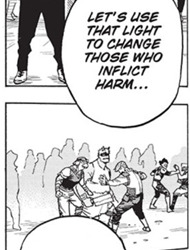
And I can’t overstate enough what a terrible resolution this is, especially given how Shouji’s own experience puts the lie to it. Remember, Shouji saved a child from drowning, one of the absolute most prototypical actions someone can do and get called a Hero by the bystanders/victims/evening news. The only thing he could have done that would have been more stereotyped would have been saving her from a burning building! He saved that little girl from drowning and the townsfolk attacked him with farming tools for it.
How much more heroic would he have needed to be? How much more of a shining light could he possibly have been? In what universe could someone with that backstory possibly think that the answer to systemic bigotry—violence that goes wholly accepted by the community and wholly unpunished by the broader society—could be this Model Minority bullshit?
Ultimately, for Shouji’s backstory to realistically have given him the motivation he professes, his actions needed to have changed the people in his village for the better. If the reader is meant to believe that Shouji’s “answer”—the premise that selfless heroism can change the hearts of bigots—then we have to see it. And, you know, even if that had been what we got, there would still be grounds to criticize it! It would still be a perhaps-too-idealistic depiction of fighting oppression; it would still put too much responsibility on the victims! But at least it would justify Shouji’s own stance.
As it is, we have Shouji choosing to believe in the changeability of people who specifically shouted while throwing rocks at him that, no matter how much the times advanced, they would never accept him. His answer does not entail a single non-heteromorph working to bring heteromorphs living in the darkness a light; it entails them kindling their own. As with Pig Nose Guy shutting down in the face of a memory of a heteromorph doctor, this resolution asserts the life-changing power of…being told that heteromorphs have to do all the work to make baseline people feel better.
Conclusion
Do I think that this terrible resolution means heteromorphobia was poorly set up or retconned? No, I don’t. I just think it means that Horikoshi is a Japanese man writing a Japanese story from a position of demographic privilege in Japanese society. I think he’s fully capable of setting up a detailed, intelligent, thoughtful discrimination allegory, a logical, internally consistent extension of the discrimination in the world around him to the alternate future he’s created—and then coming to a completely different resolution than I would because his context led him to different answers than I wanted or found acceptable. Compared to the U.S., Japan as a culture is more communal, more collectivist; they have less history with successful protest movements, more history with protest movements turning violently extremist or just being ignored by those in power. The idea of “not making trouble for others” is an incredibly deeply engrained value.
I have a decent idea why this resolution is what it is. I can try to make myself view it through the more generous, forgiving lens of Cultural Differences; I can fail to do so and instead conclude that this is portrayal is much less about Cultural Differences than it is yet another in a long chain of Well-Meaning Majority-Culture Author Writes Discrimination Allegory, Fucks It All Up Because of His Well-Meaning Majority-Culture Centrism. That doesn’t mean I believe heteromorphobia came out of nowhere, and I hope this essay has at least demonstrated that much, whatever you might think of its resolution.
——————————
Thank you so much for taking this journey with me, all! At 42,000 words and 93 pages in Word, there's definitely more I'd like to do with this, chiefly taking a spin through the Vigilantes spinoff, which I've always found to be very good at grappling with practical questions and concerns BNHA Core largely ignores. The character of Kamayan is particularly relevant to this topic.
However, for now, I'm going to take a break on this subject and turn my attention to something else. I'm not sure what it'll be quite yet, but meta projects that have moved towards the top of my list concern the ridiculous series of nerfs Toga has been subjected to in this endgame, arc thoughts on everything I hate about the stupid, stupid All Mech fight, and an organized argument for the endgame being chock-full of retcons that are obvious if you look at them for more than the five minutes it takes to read a chapter each week.
You may notice that all of those are pretty negative-sounding, and you would be right. Given that the whole reason I stopped doing my chapter posts is that I was weary of the constant negativity, the actual next thing I do will probably be to get back to one of my neglected MLA fanfic projects.
'Til next time, all!
#bnha#bnha meta#bnha worldbuilding#heteromorph discrimination plot#octolad#plf advisors#my writing#preview for Vigilantes:#Kamayan is a crank and that distracts everyone#from realizing that Kamayan is also right
49 notes
·
View notes
Text
The more I think about it the more it feels like the Watcher's Council really should have been the big threat of Buffy's fourth season, rather than the Initiative.
I mean, think about the precedents:
The focus of Season 1 is on Buffy coming to terms with having to be the Slayer and what that means for the rest of her life, but this season also introduces the character of Angel and establishes that he is a vampire with a soul, a long history of violence and with strong personal connections to other vampires. It even raises the possiibility of Buffy having to kill him. And the conversation Buffy and her friends have towards the end of the episode, when she thinks Angel attacked her mother, pretty much foreshadows the main plot of the second half of Season 2:
Xander: "Buff, it's not your fault."
Buffy: "No? I knew who he was, what he was, and didn't do anything about it. Because I had feelings for him, because I cared about him…"
Willow: "if you care about somebody. you care about them. You can't change that by--"
Buffy: "Killing them? Maybe not, but I think it's a start."
[Season 1's "Angel" foreshadows the plot of Season 2]
Then in Season 2, while the focus is on Angelus and Drusilla and Spike, the season also introduces a couple of things that will be incredibly important next season. Namely the fact that there's now a second active Slayer in the world -- and while Kendra never really gets a proper character arc of her own, Buffy's reaction to realizing she exists anticipates a lot of her reaction to meeting Faith -- and also the fact that Sunnydale's political establishment knows a lot more about the supernatural than they've been letting on:
Snyder: "This is getting out of hand. People will talk."
Police chief: "You'll take care of it."
Snyder: "I'm doing everything I can, but you people have to realize … we're on a Hellmouth. Pretty soon people are going to figure that out."
Police chief: "The city council was told that you could handle this job. If you feel that you can't, perhaps you'd like to take that up … with the Mayor."
[Season 2's "I Only Have Eyes For You" foreshadows the plot of Season 3]
And then we get to Season 3, where yes, the Mayor and a rogue Slayer are the driving force of the plot. But this season also introduces for the first time the idea that Giles isn't just a Watcher, he's a (fairly junior!) member of a formal organization called the Watcher's Council. And we see that the Council are large and bureaucratic, that they know about demons and vampires but are prone to underestimate them, and that not only are their goals not always aligned with the Slayer but their leadership is personally at odds with her. We even see that the Council like to capture vampires (for tests!) rather than killing them. And Wesley gives us an idea of what life is like for those Watchers who don't have a Slayer to monitor:
Wesley: "Of course, training protocols have been updated quite a bit since your day. Much greater emphasis on field work."
Giles: "Really?"
Wesley: "Oh, yes. Not all books and theory nowadays. I have, in fact, faced two vampires myself. In controlled conditions, of course."
[Season 3's "Bad Girls" foreshadows …?]
And then the plot of Season 4 relies on the existence of exactly such an organization, "fighting a war" against demons and vampires without any Slayer involvement while being suspicious of and hostile toward Buffy and her friends. But for reason this organization is not the Council. It's ... a group we've never met or heard about before, who haven't been foreshadowed at all.
Wouldn't it just make so much more sense, internally, for the Council to start to place an even greater emphasis on 'field work' and send out its own agents to capture and study vampires as a result of Buffy quitting at the end of Season 3? Rather than the weird retcon that the Army have been running tests underneath the campus of Sunnydale U for months without anybody noticing, and somehow without finding out anything about the Slayer who lives directly on their doorsteps? Wouldn't Professor Walsh make a lot more sense as a character if she were a Watcher who knew all along that Buffy was the Slayer and didn't trust her because she'd quit the Council?
And we even see later (in this season's Who Are You?) that the Council has a paramilitary wing! Why does Season 4 need two separate pseudo-military organizations who hunt demons and run tests on vampires and don't like Buffy Summers?
76 notes
·
View notes
Text
The live action ATLA is amazing. 9.5/10. I didn't love everything about it, but there are so so so so many good parts and I'm so glad that Netflix decided to make this. I've seen a lot of weird criticism from long time fans and maybe I just haven't been in the fandom long enough, but. I absolutely think it's worth giving a watch if you go in with a semi blank slate. The Netlfix series is not trying to be an exact scene by scene remake of the show.
The thing about it that you have to remember when you go in is that they said they were going to change the tone of the show, and they did, and it works! It's not the same. It's not a comedy. It's funny, but it's not a comedy. Character motivations were changed to fit the darker theme. It's using Avatar as source material and intends to be an adaption, not a reconstruction of the series.
Katara is much more traumatized about her mom's death, which made sense! She was murdered in front of her. She's afraid to take on a maternal role because of that. She's quieter and softer because she's afraid and she's healing from her mother's murder. Katara in the series made sense, too, but I feel like someone looked at her and went! Wait. Smol child is maybe...not okay??? I have faith they will build her up as the seasons progress if they continue.
Hakoda is disappointed in Sokka barely passing his trial. Makes sense! They're at war! Sokka has to take care of the village, of course Hakoda has high expectations for him. And the thing is--Hakoda still trusted Sokka with the responsibility of the village anyway, so his disappointment in Sokka's trial didn't stop his faith in his son. And honestly, I think it's fine that Hakoda is not a perfect parent who never makes mistakes. Parents rant about their kids to their friends all the time. It's healthy because they're not doing it in front of, or to, their kid. Hakoda didn't know Sokka was listening. So. Idk. Sokka doesn't go through his misogyny is bad actually arc, and while I missed it, I thought he functioned really well in this story without it. And for the record!!!! Sokka STILL makes stupid jokes the entire season. He didn't lose his sense of humor.
Aang feeling so much guilt about leaving? Yep! I can vibe with that. I missed his innocence and playfulness, but I feel like this wasn't a bad take on the character either. He was still playful, but in the world they live in, it would make sense that he feels terrible for leaving. And everyone they encounter takes it upon them to rub it in his face so why wouldn't he feel bad or out of place?? Especially after Bumi. Everyone says he needs to face this alone, and Aang learning that he doesn't have to?? Powerful!! Is it the same arc as s1 of the show? No! It's not supposed to be!
Zuko's actor was perfectly cast. That boy IS Zuko. The scence at the end of e6 made me cry because it was so powerful with the 41st, and that felt so EARNED after episodes of watching Zuko's crew despise him to suddenly realizing the only reason they're alive is because of him and realizing it's an honor to shelter him. Zuko drawing Aang to pin him on his disaster wall was amazing. Him getting hit by some random woman for attacking Aang? Amazing. Him sitting next to Iroh during Lu Ten's funeral? So soft. The Agni Kai really rubbed people the wrong way, but I think it was interesting that they decided to have Zuko showing compassion be the root of Ozai's anger. He showed compassion to the 41st, he shows compassion to his father, and when Ozai has defeated him, he has him on the ground and could walk away, and he chooses to burn his face. It's not exactly the same as the show, but again, it's not intending to be.
Azula being here was interesting. I don't know if I loved Zhao being incapable of doing anything without her, but it works for what it is. Zhao is intended to be annoying and he was! So. 10/10. She cried when Zuko got his scar! Ozai playing the long hand of terrible abusive tactics made me want to bite him. Because Ozai doesn't care about Zuko. He uh. Made that pretty clear when he banished him and then at the end when he's explicitly told Zuko might have died at Agna Qel'a and he's like ????????? Am I supposed to care??? We've gotten rid of weakness. So??? Like he used Zuko to force Azula to become more ruthless. He used Zuko to shape her. I do hope we get more exploration of Ty Lee and Mai so they aren't Faceless Blorb Friends, but I just don't think there was really time in s1.
The parts they chose to remove and add into the story was interesting. You got to explore the story for the first time again. I definitely think both versions have merit and are deeply enjoyable, I just don't think you should go in expecting it to be exactly the same thing? I was happy to see a new take on the story, but that might be because I knew that it was going to be darker and the characters would adapt to that. I do hope we can get more of the vibe of the show's humor in season 2 if we get season 2, and Katara feels little more like her show-counter part because I missed her, but honestly, I do recommend to a friend.
Or at the very least, if you absolutely refuse to watch it, PLEASE go watch the last 1/2 of episode 6 with Zuko and the 41st because I CANNOT.
+THEY ACTUALLY PRONOUCED EVERYONE'S NAMES CORRECTLY #bareMinimumAward
#avatar the last airbender#avatar live action#Netflix Avatar#netflix avatar spoilers#atla#idk#my two cents#i binged the whole thing and I had fun#i haven't wanted to binge anything in forever#but I hope they get renewed because I'd love to see their take on s2 and 3
23 notes
·
View notes